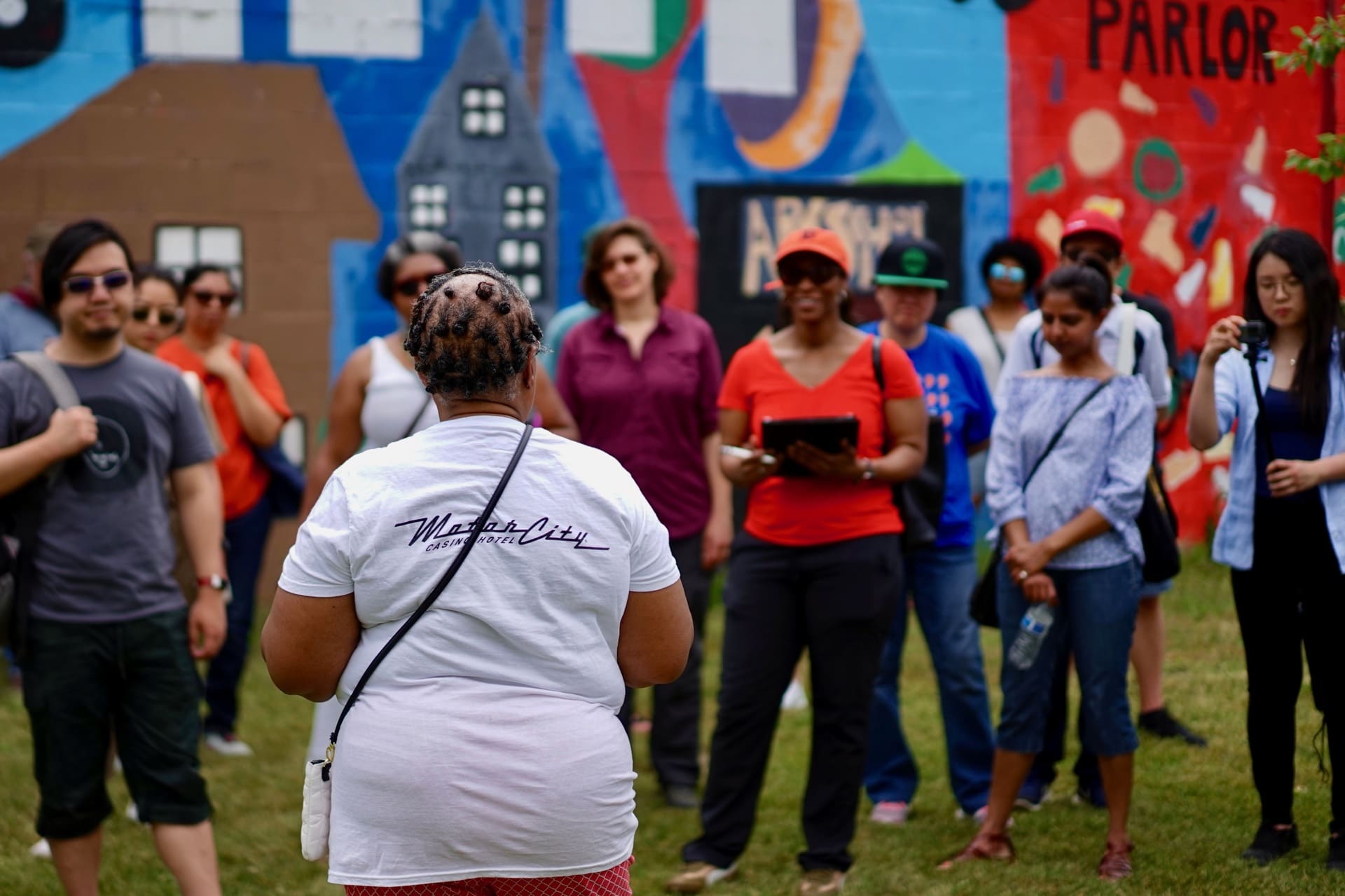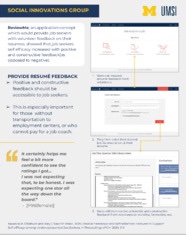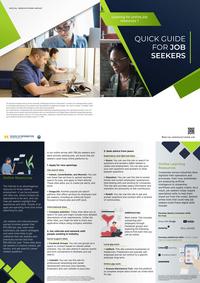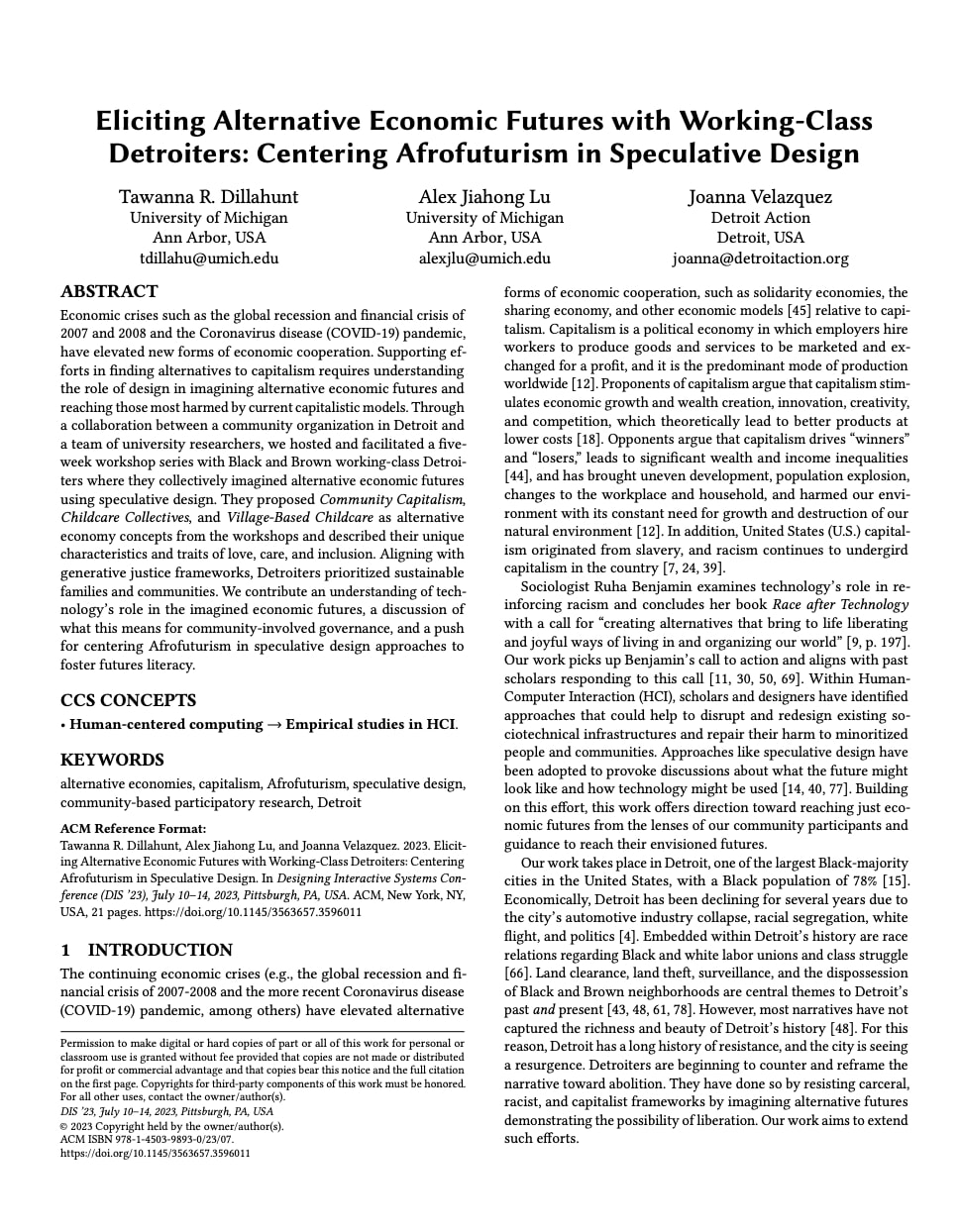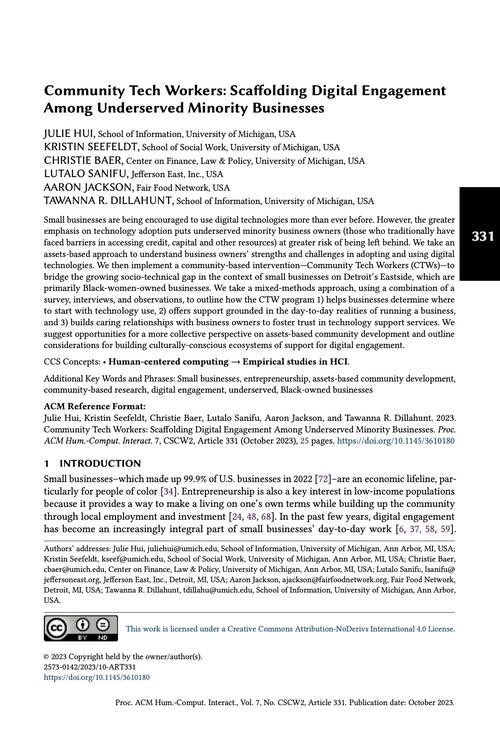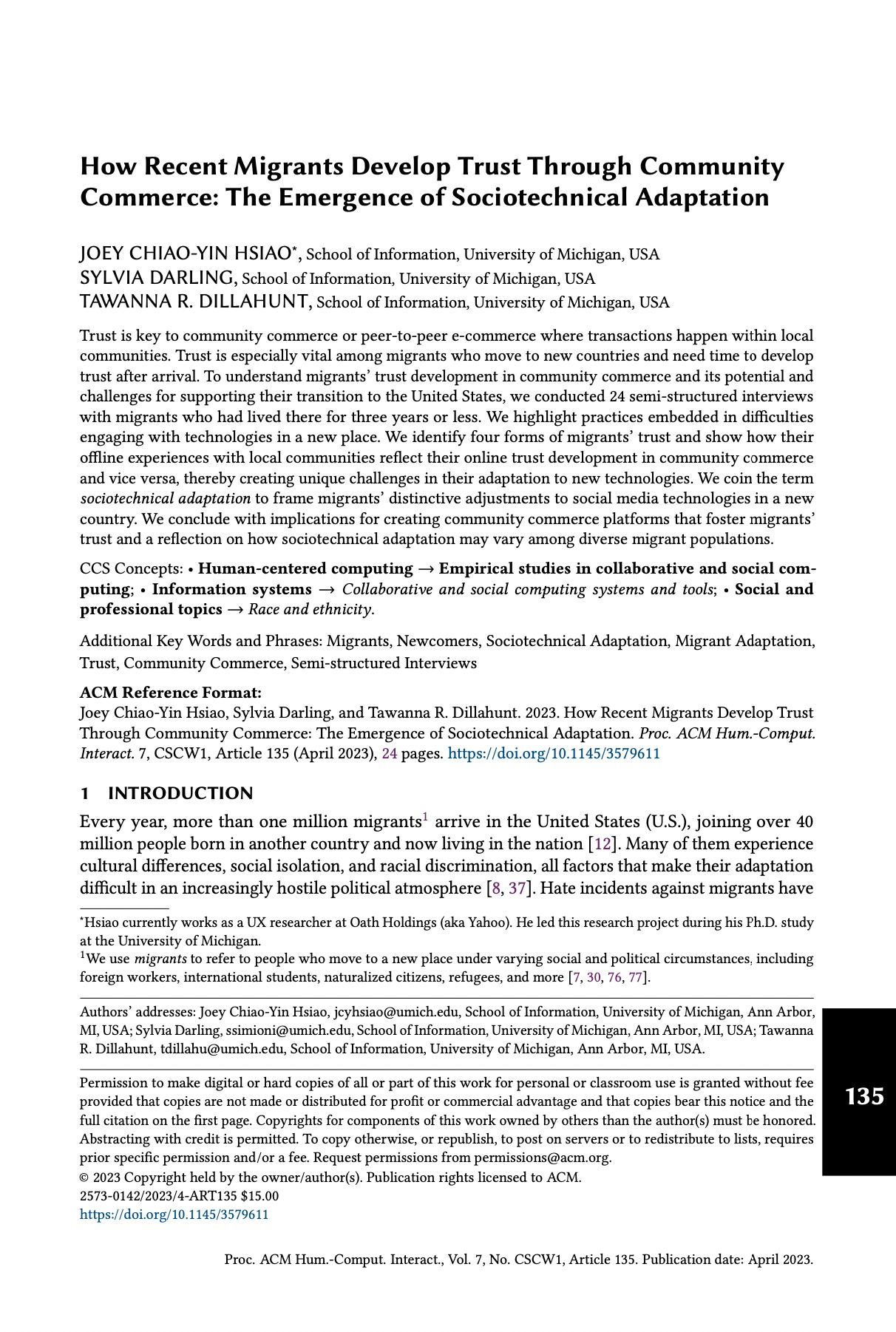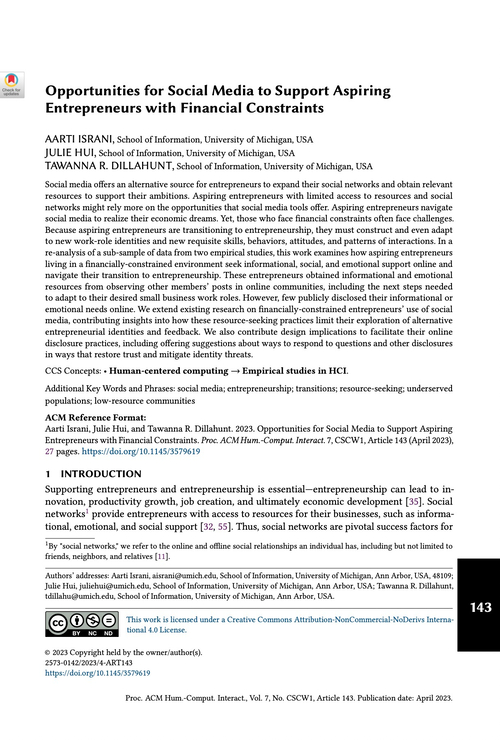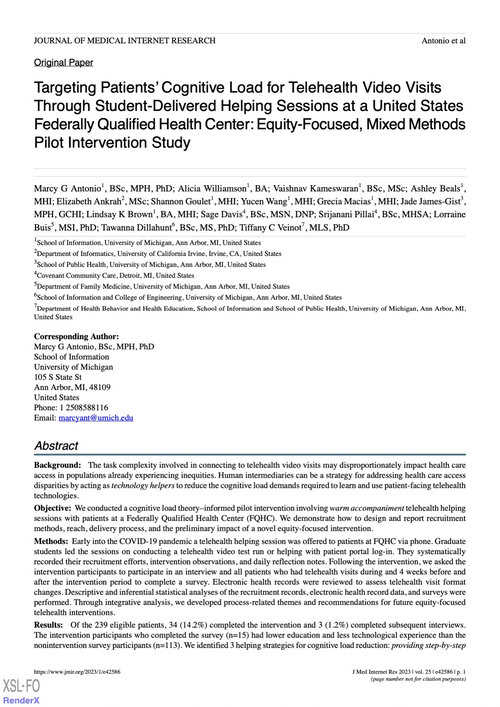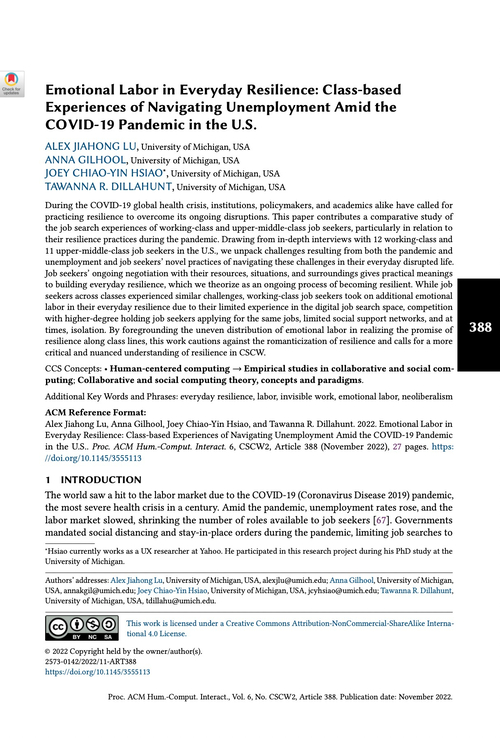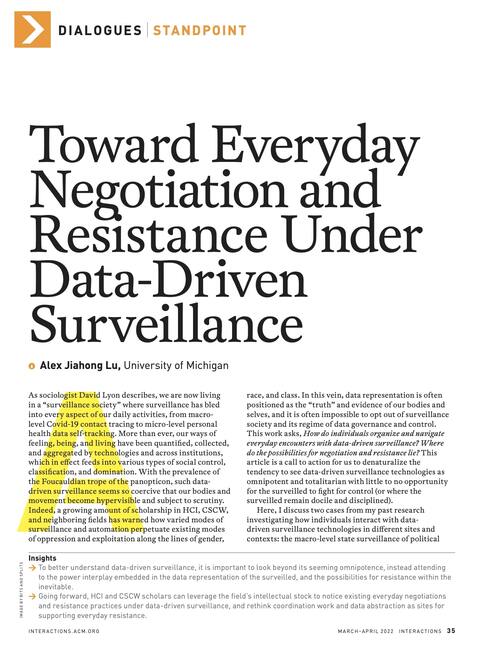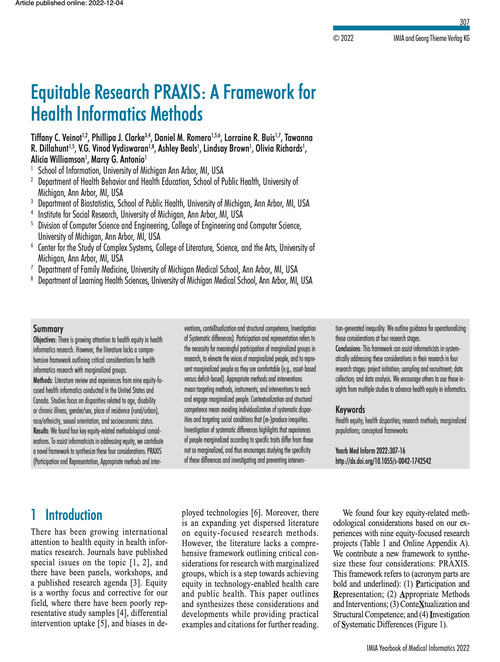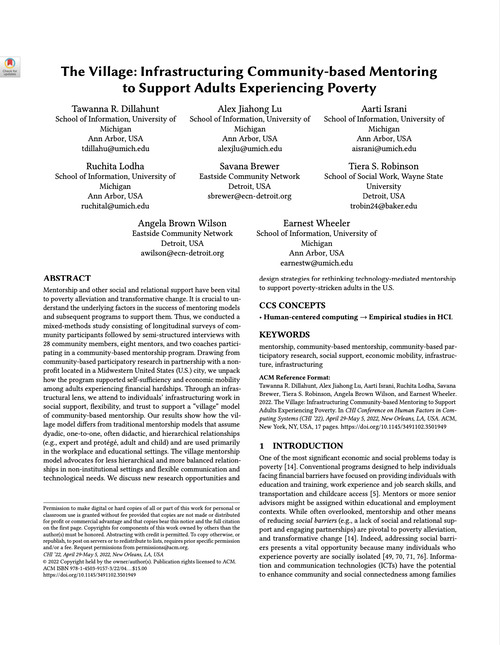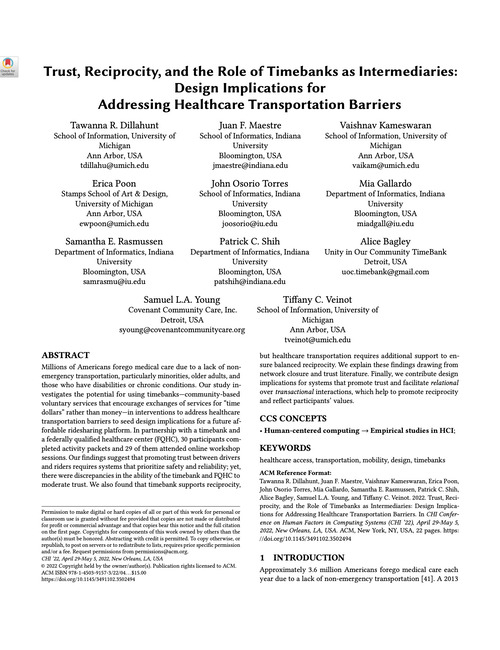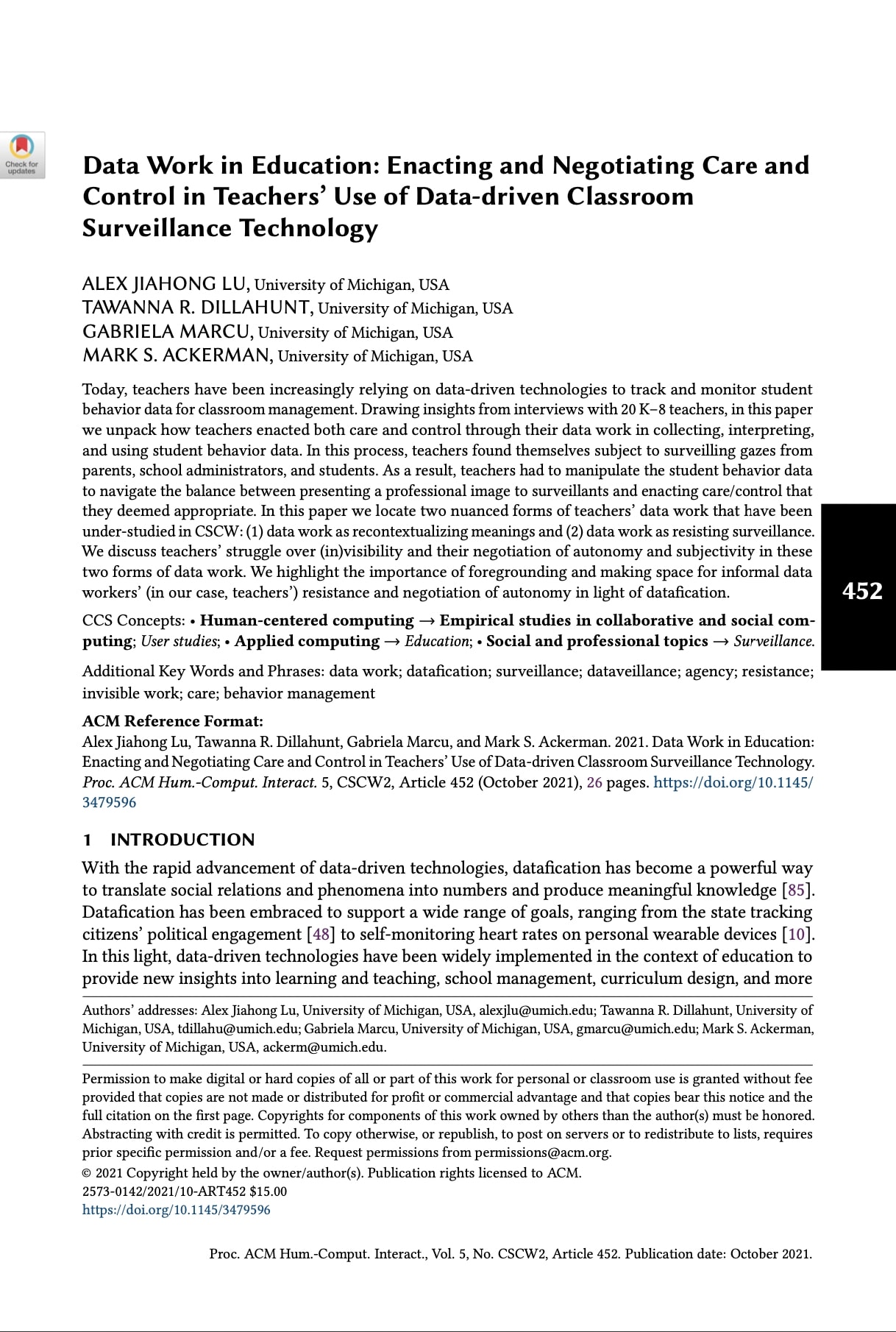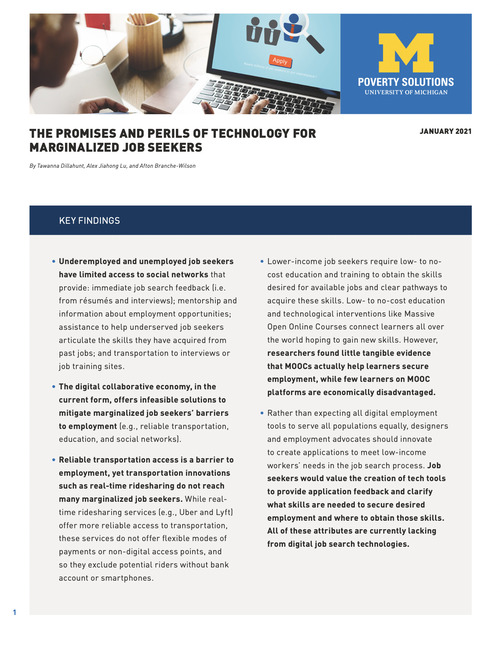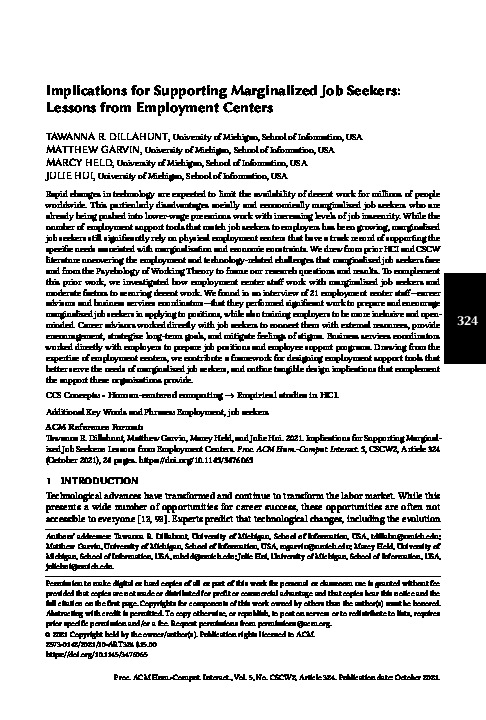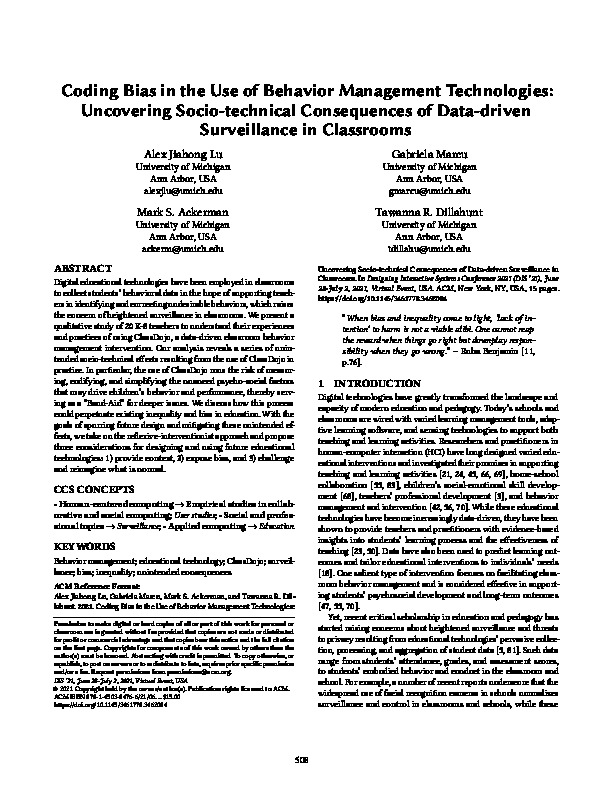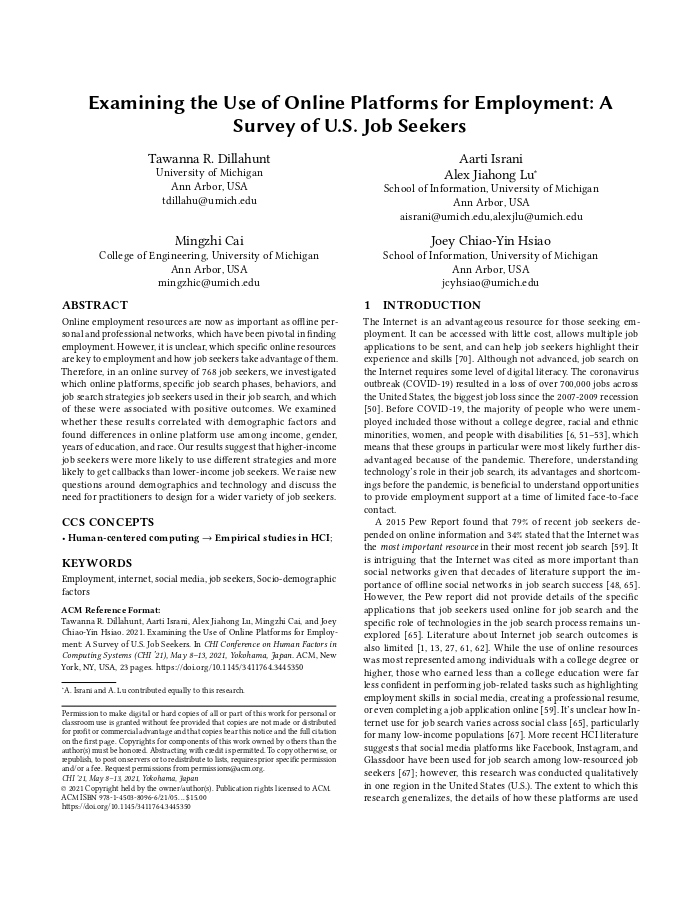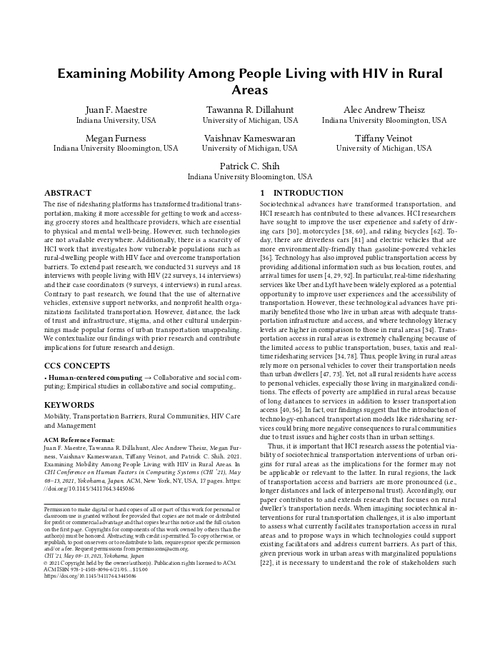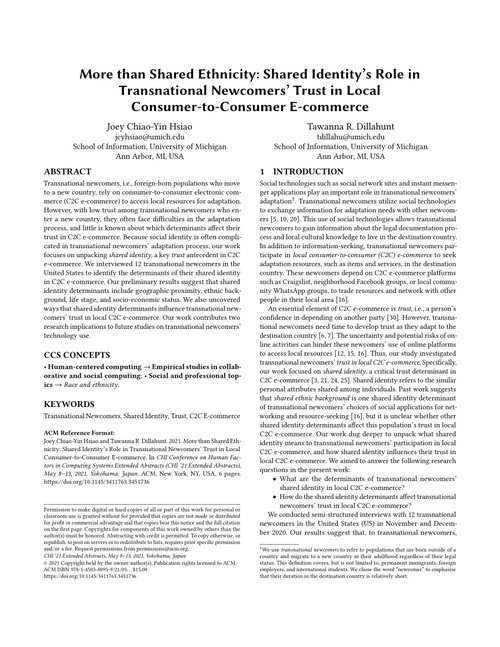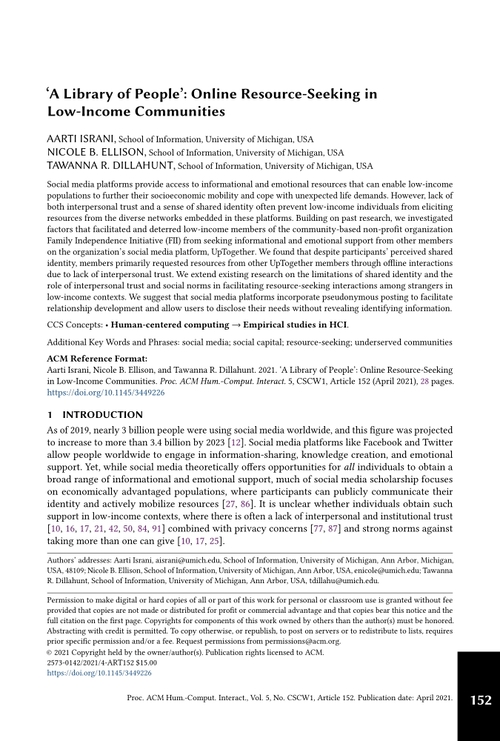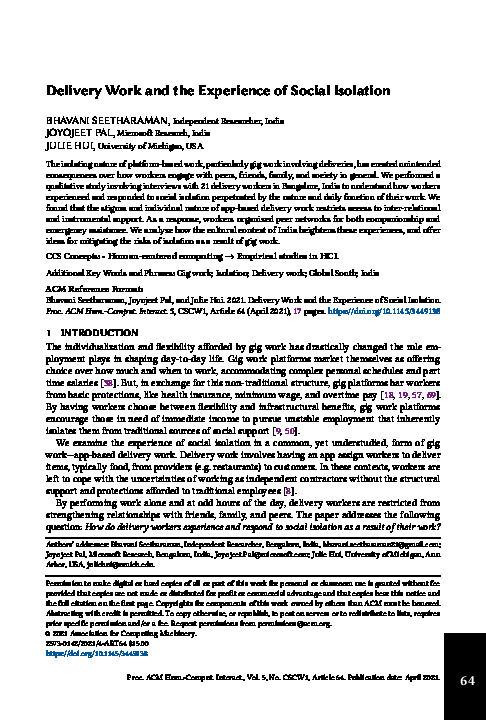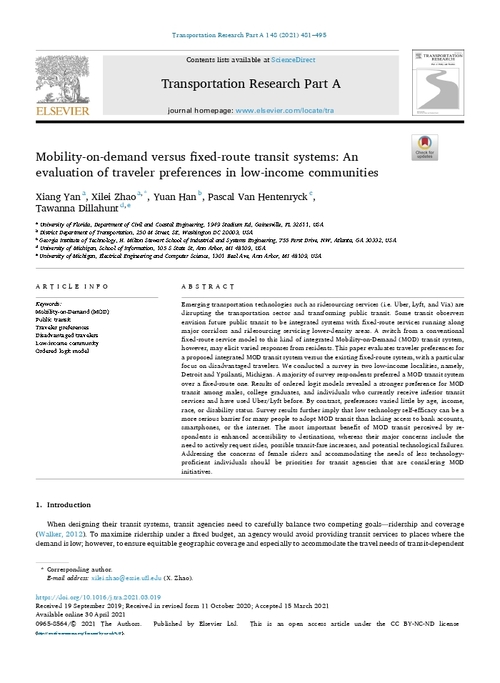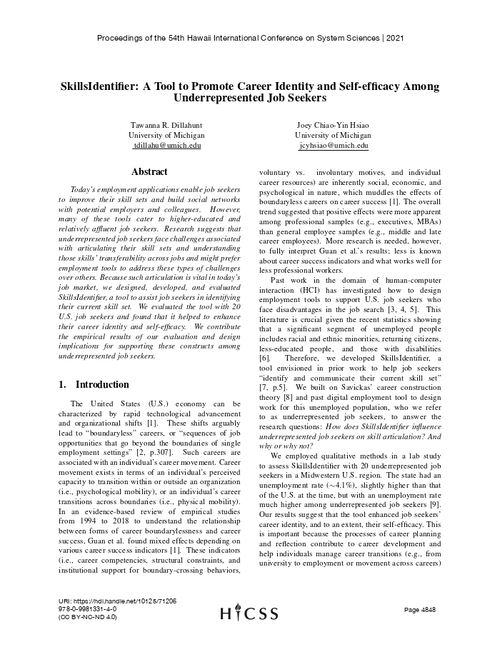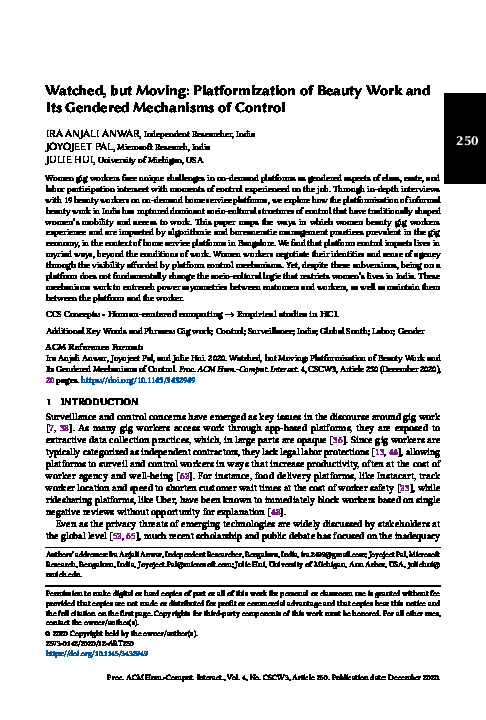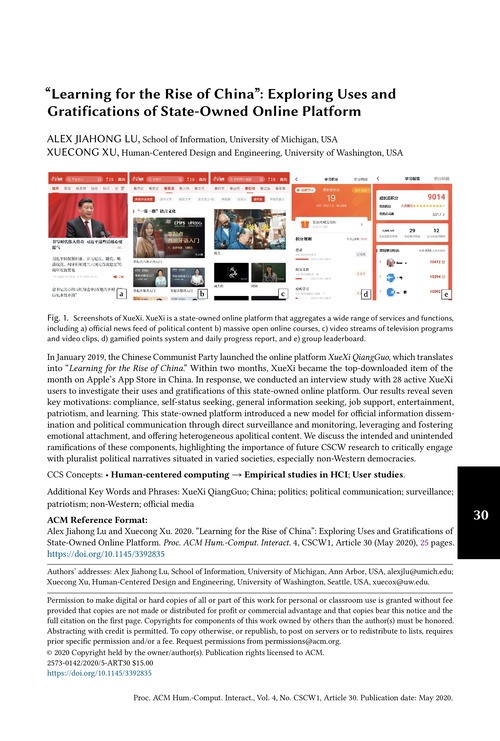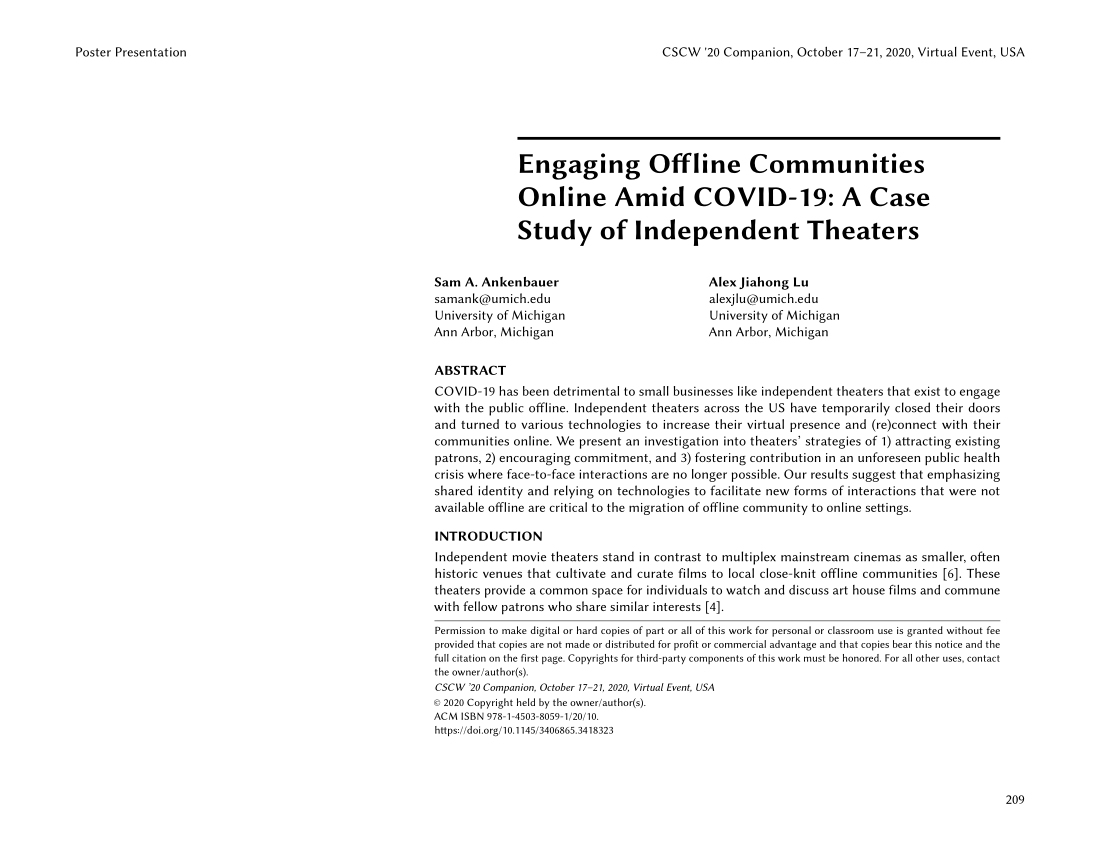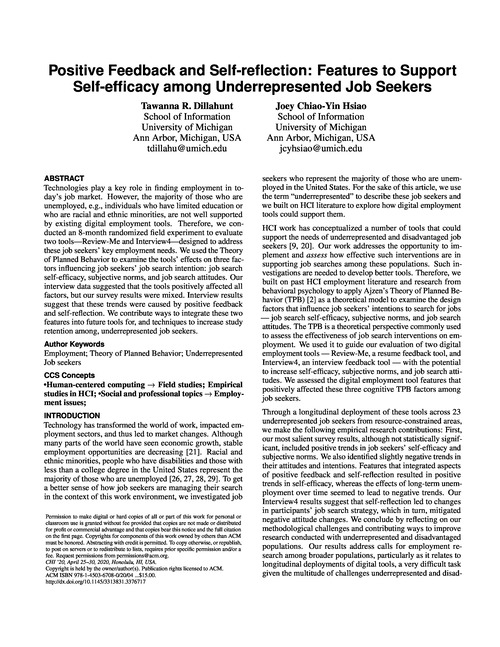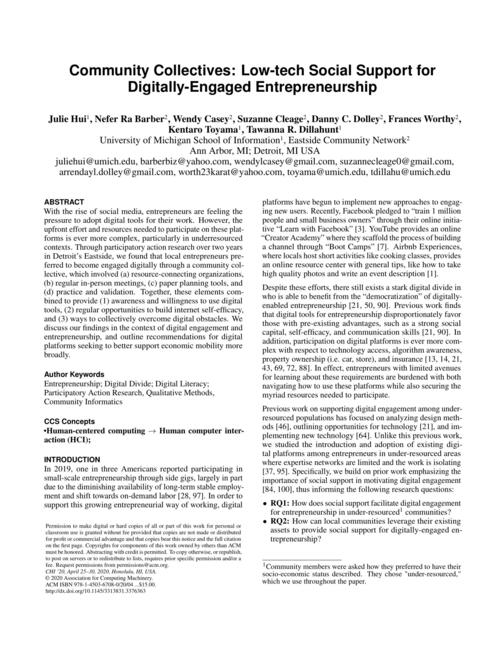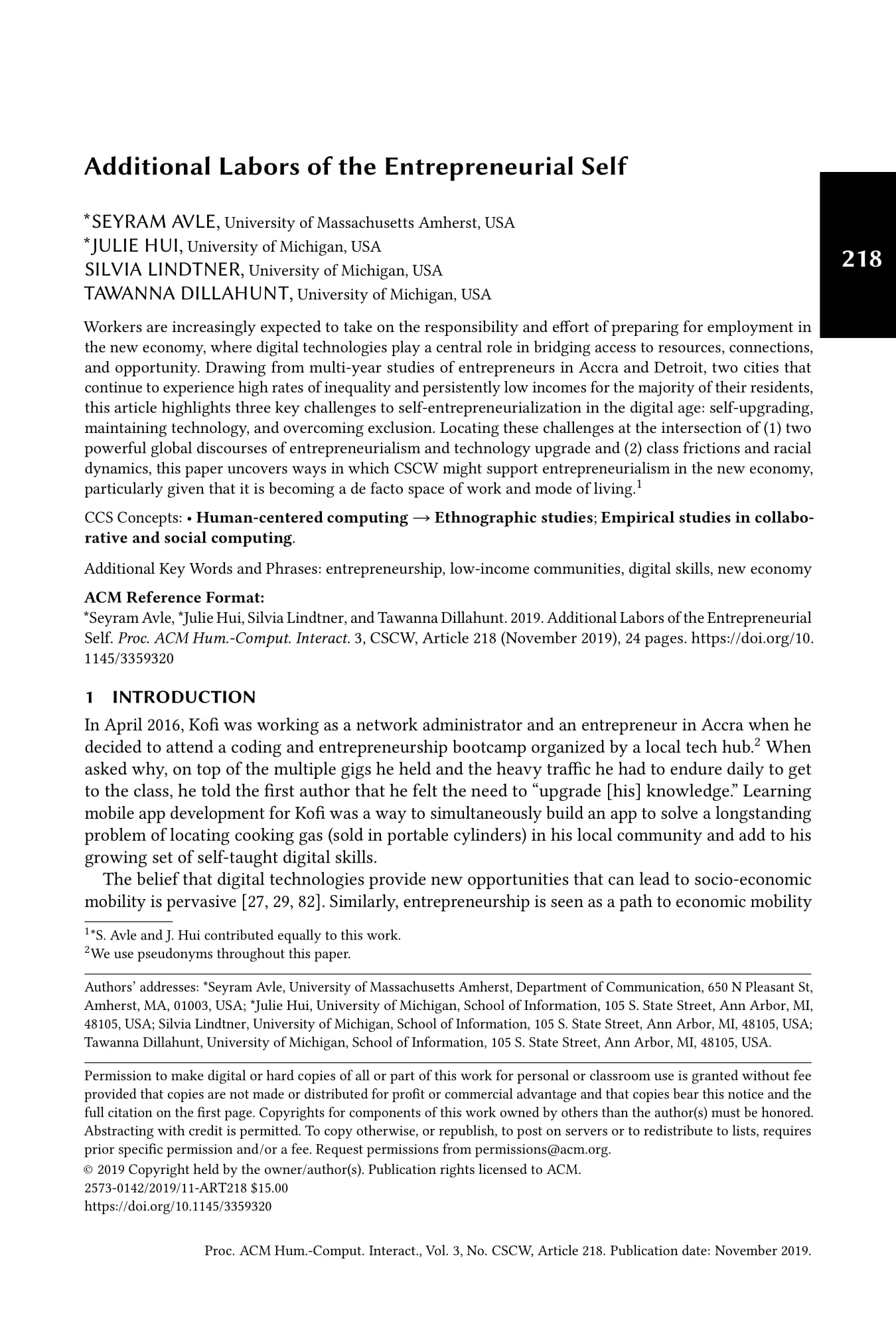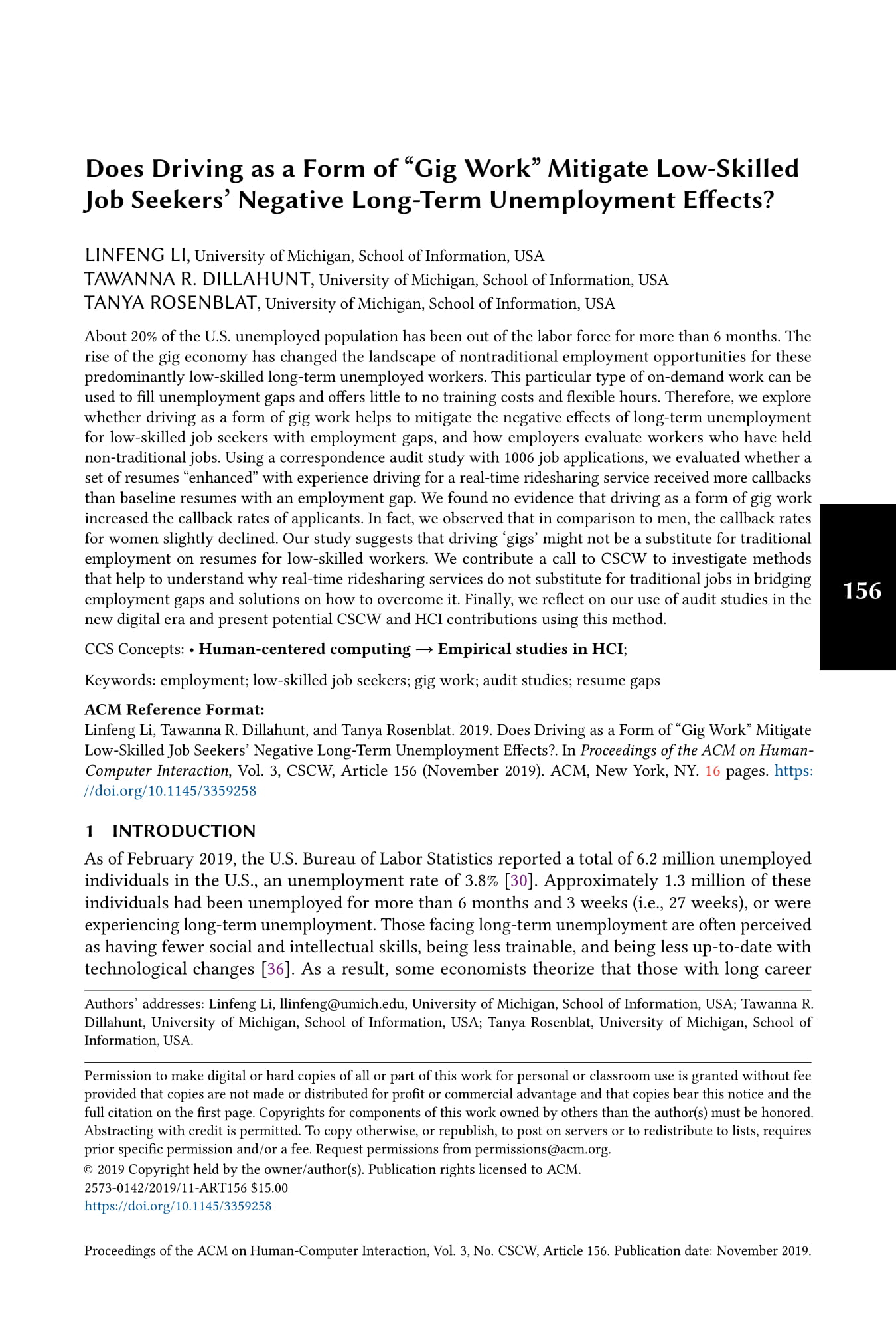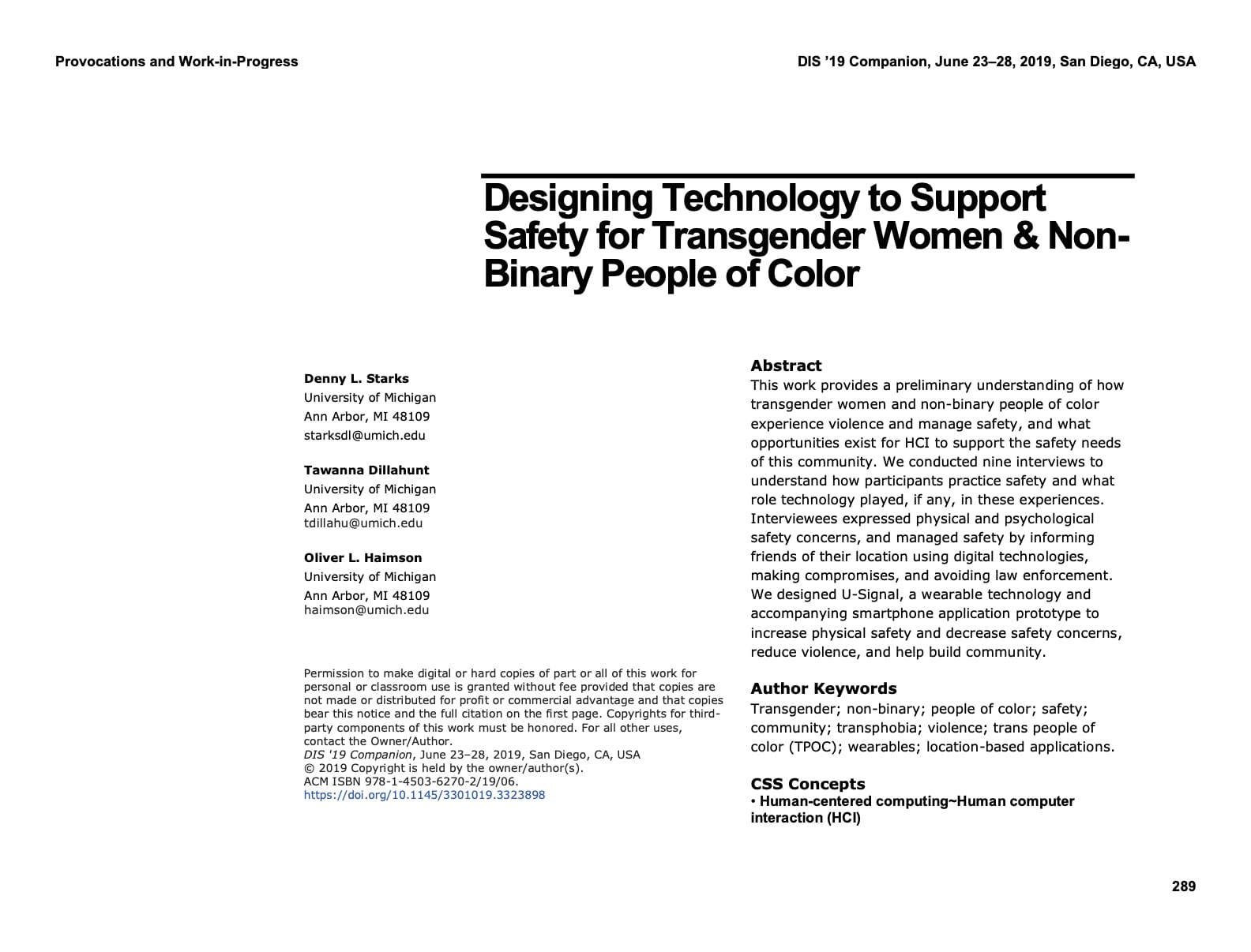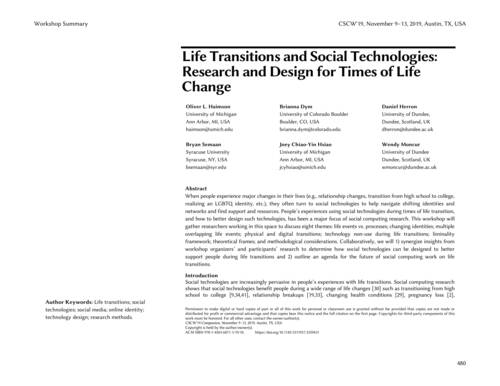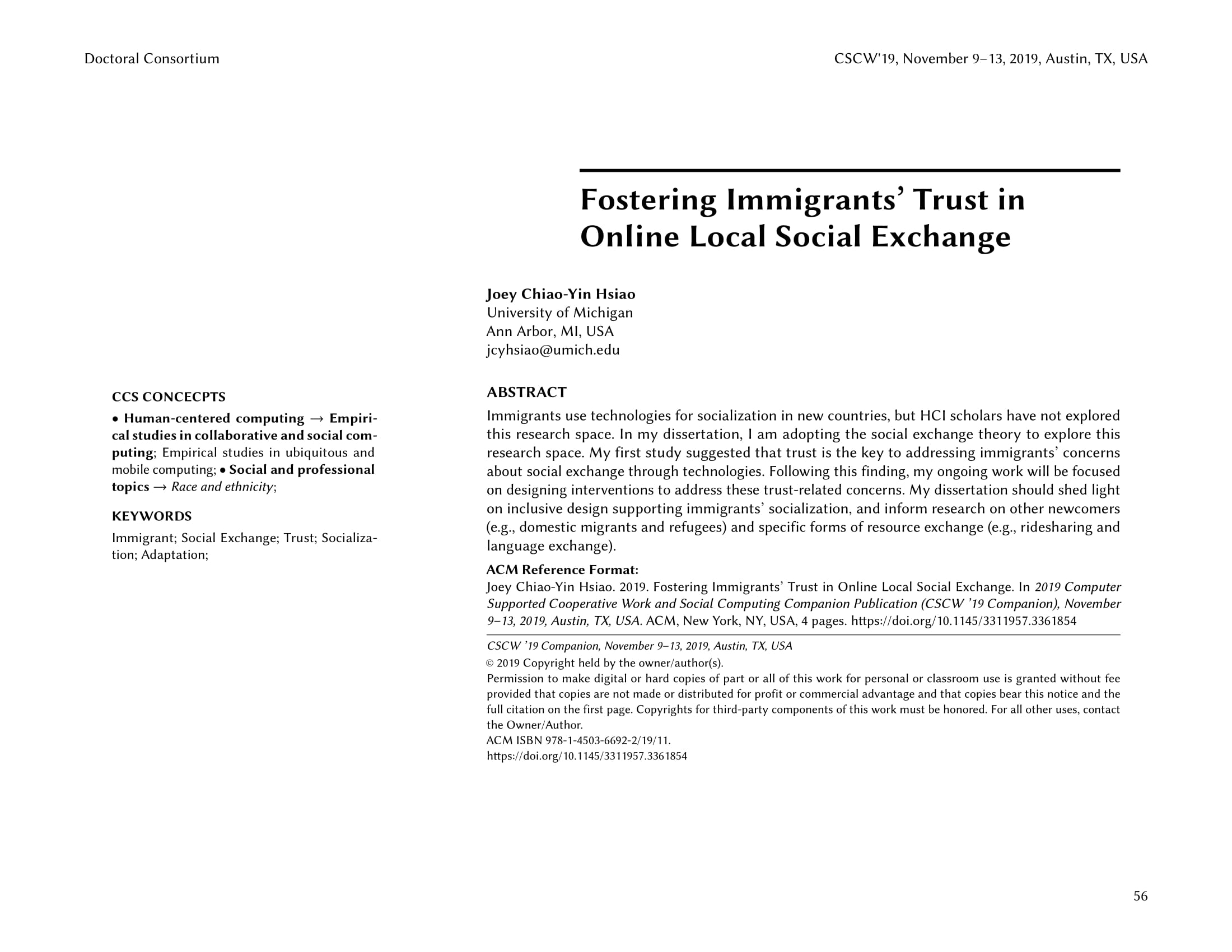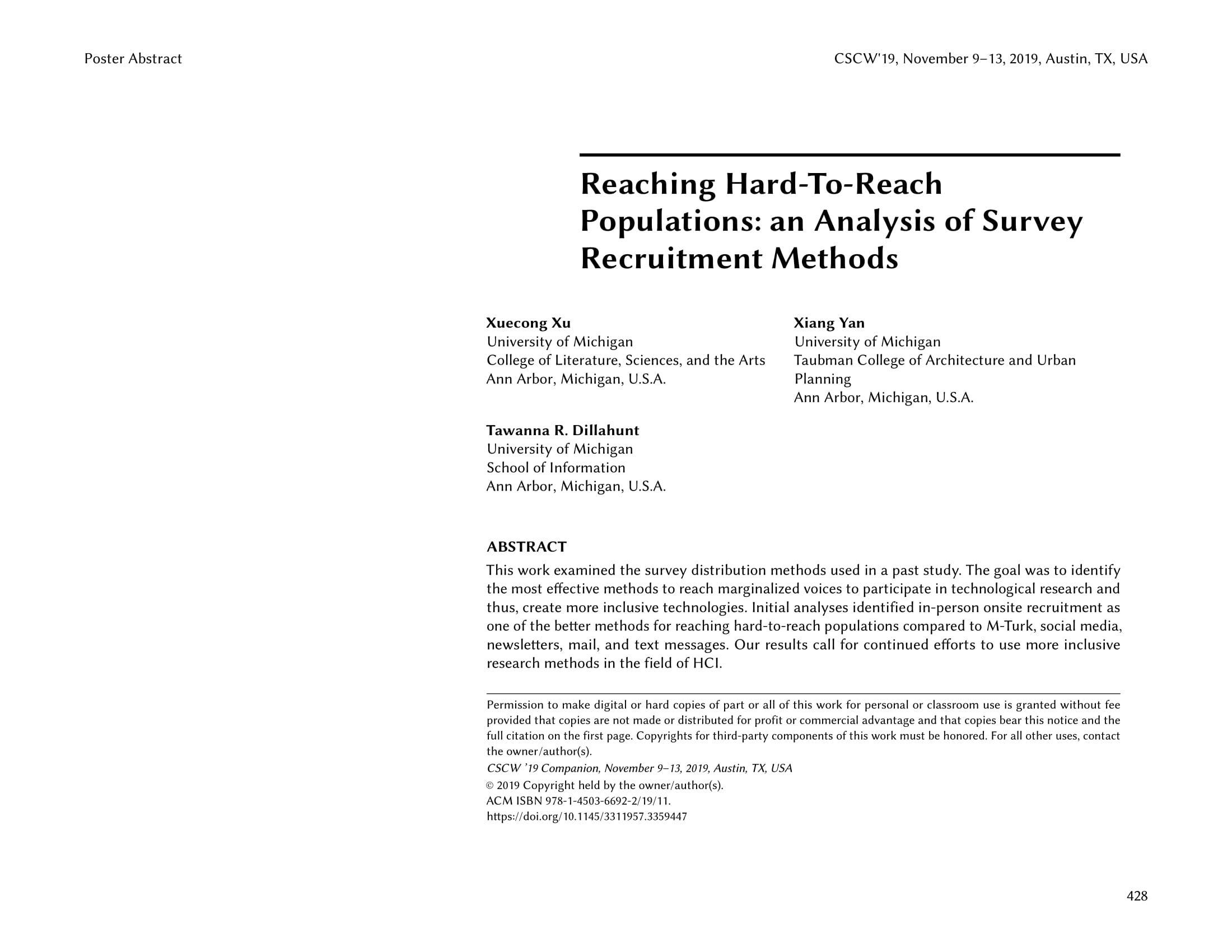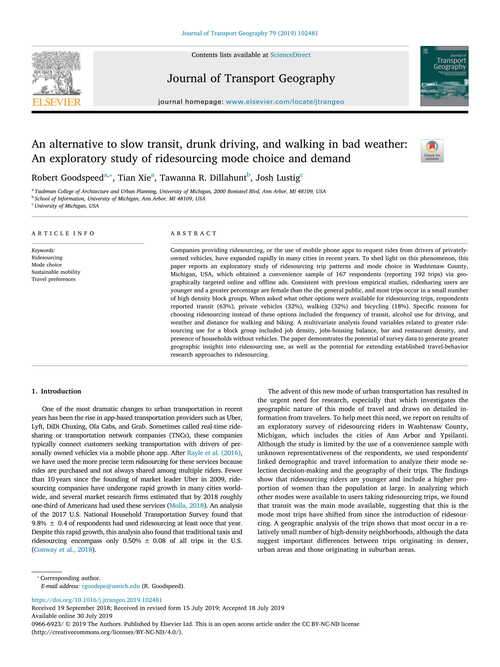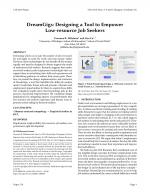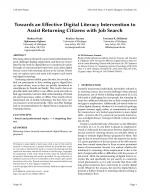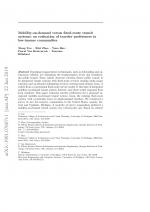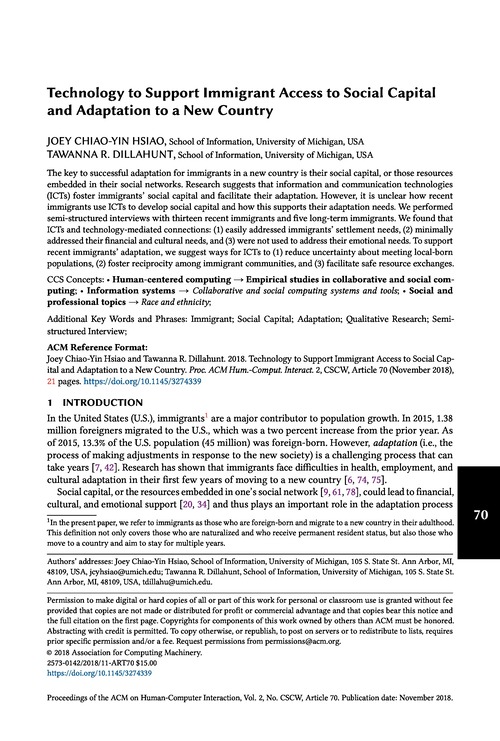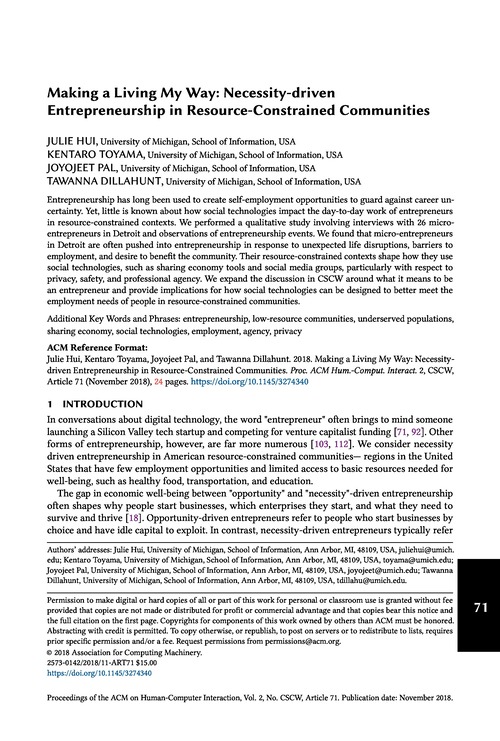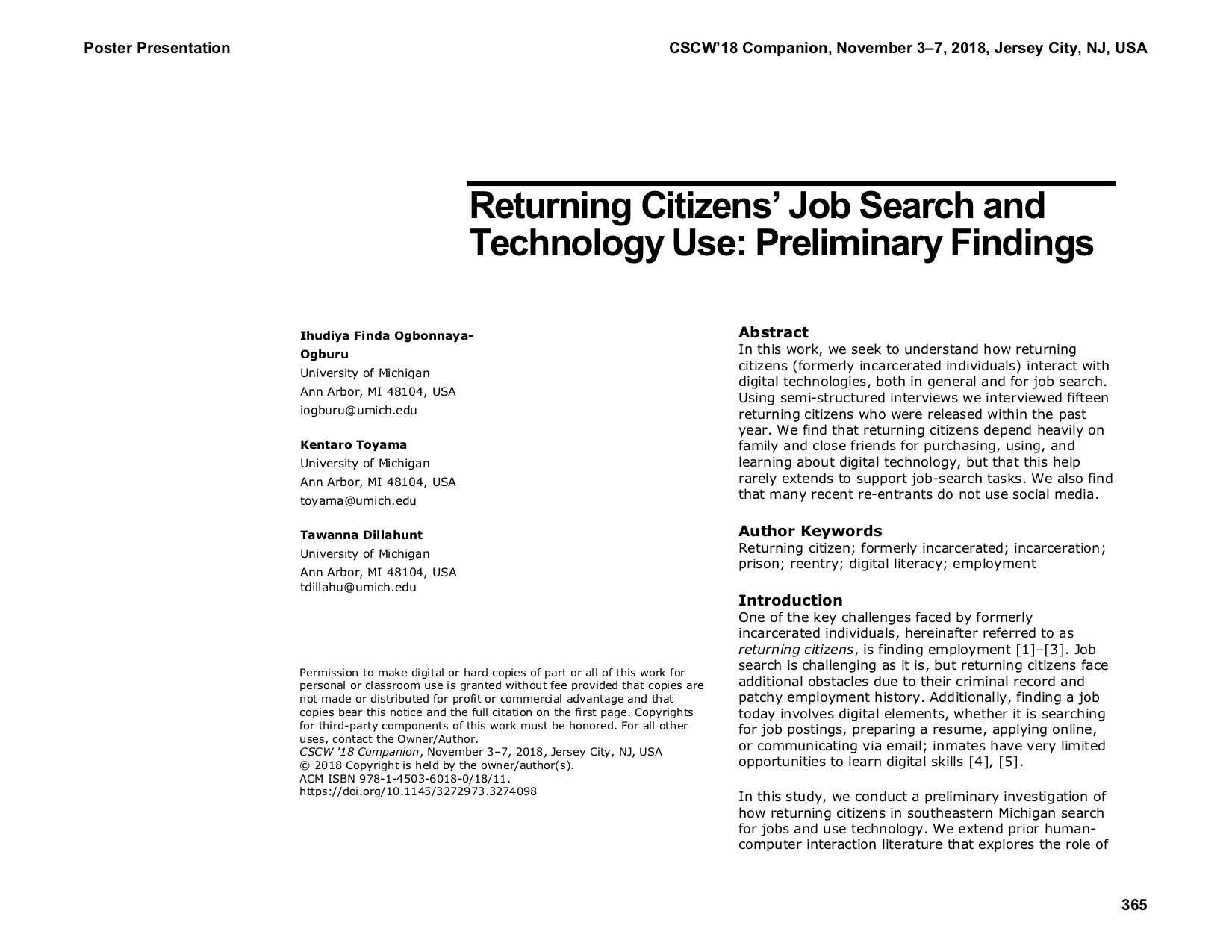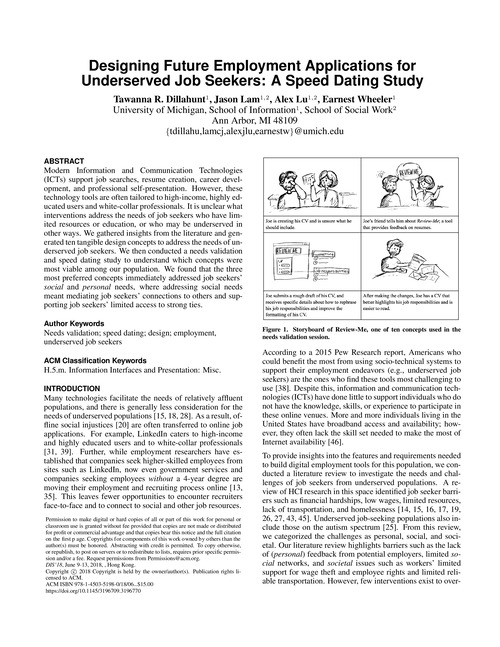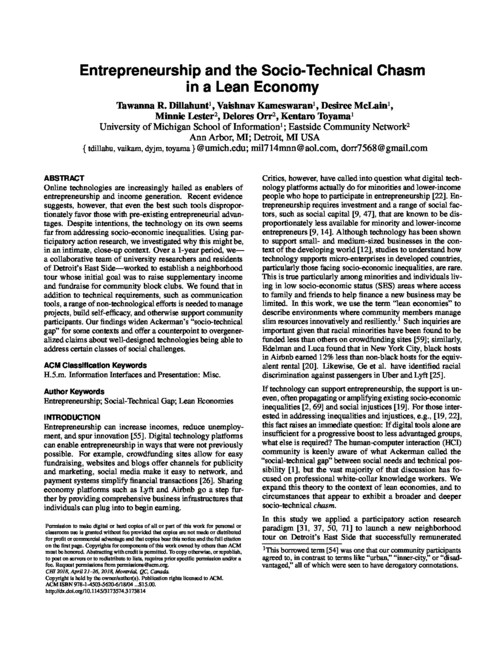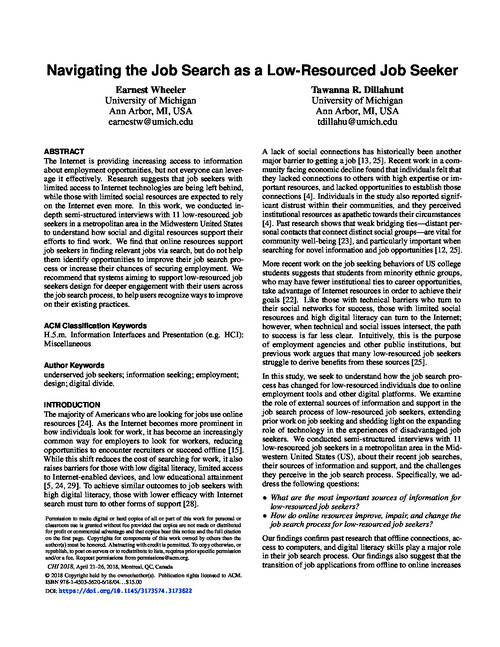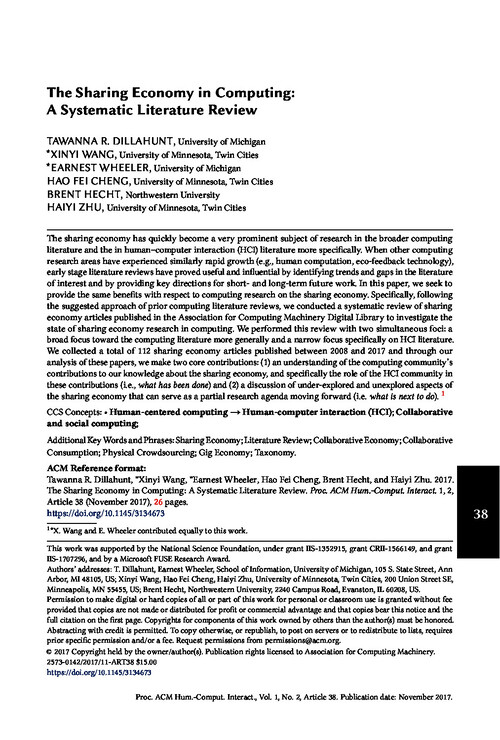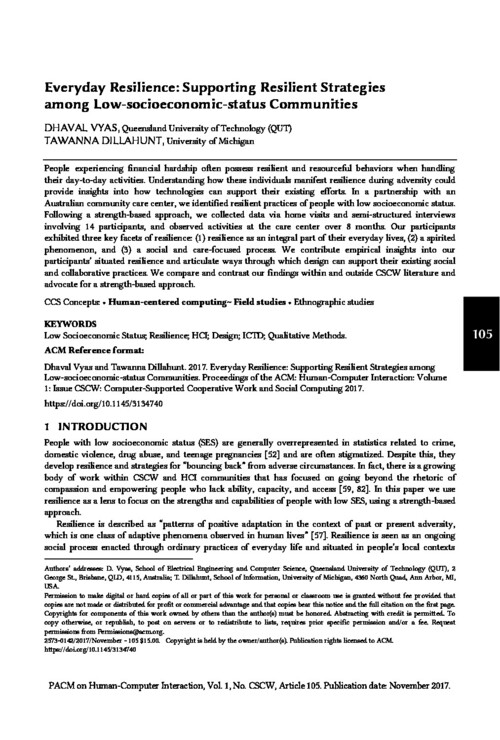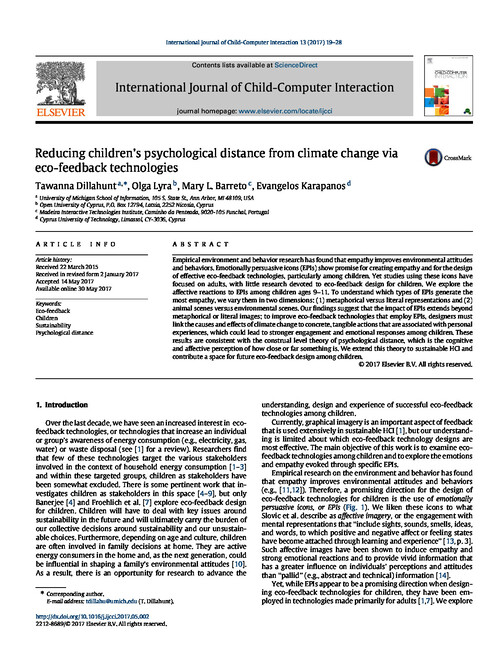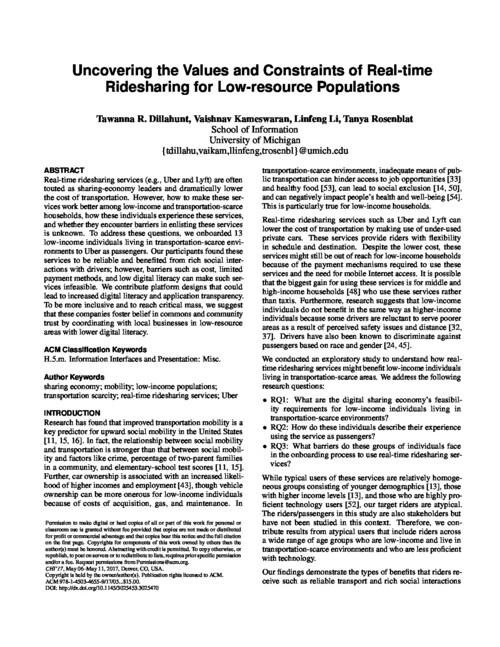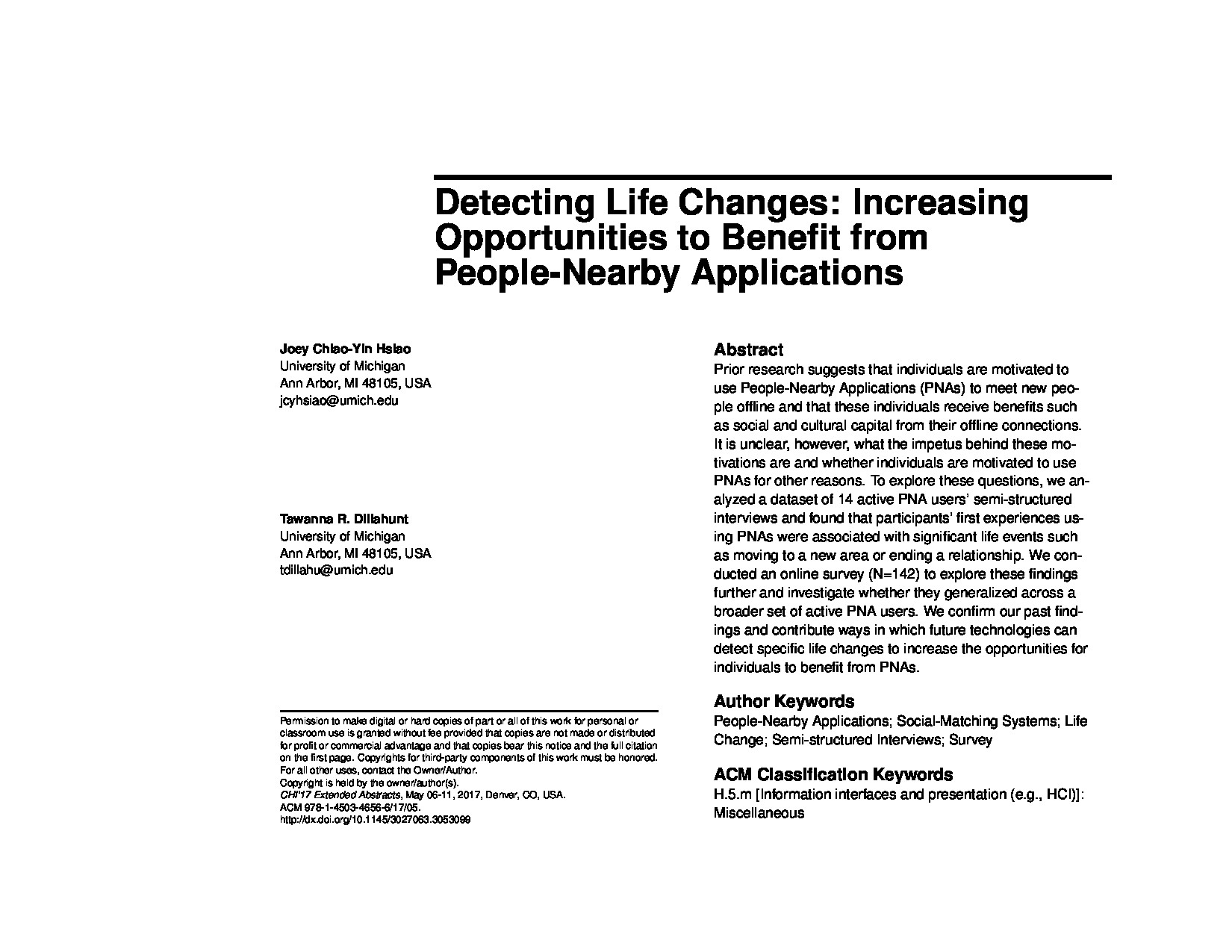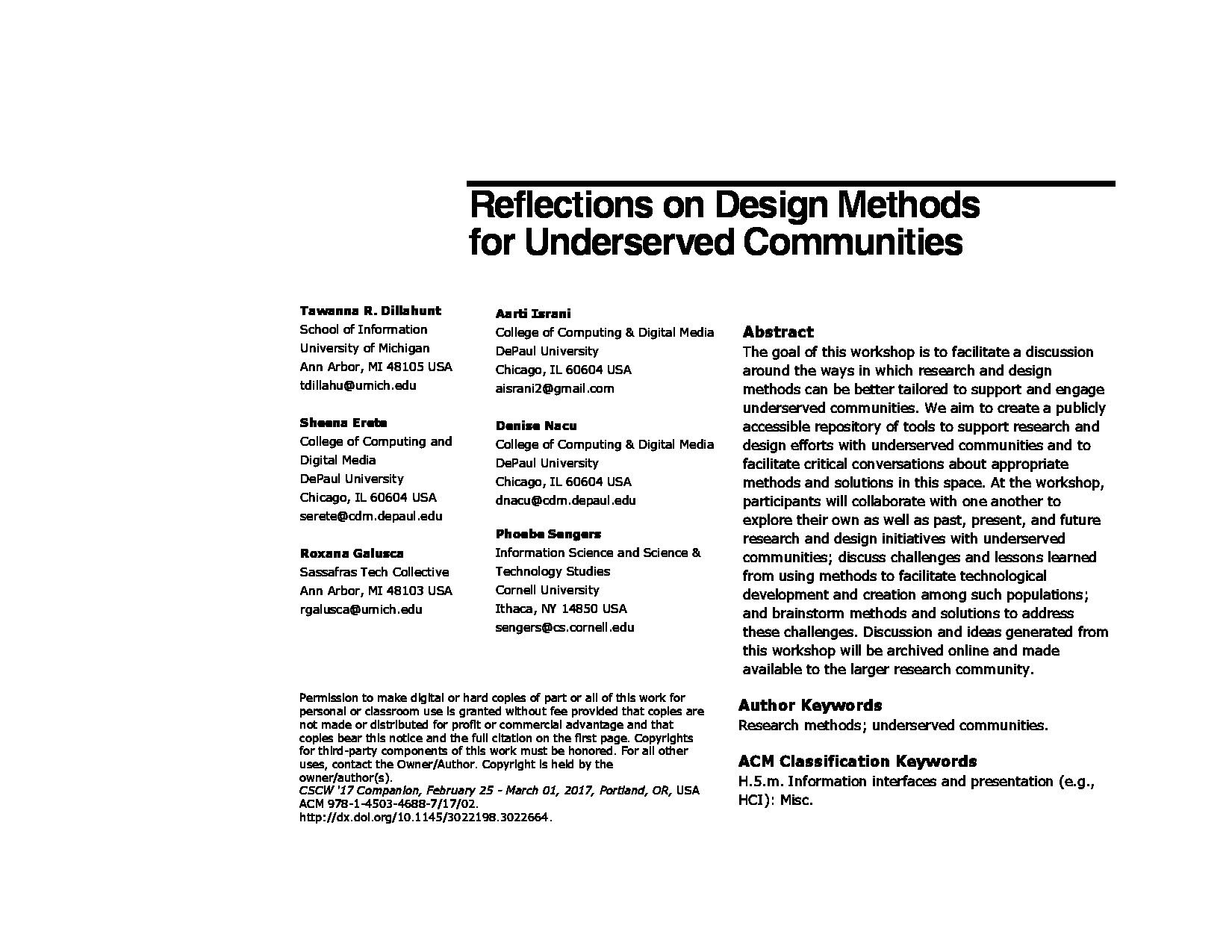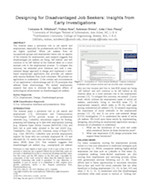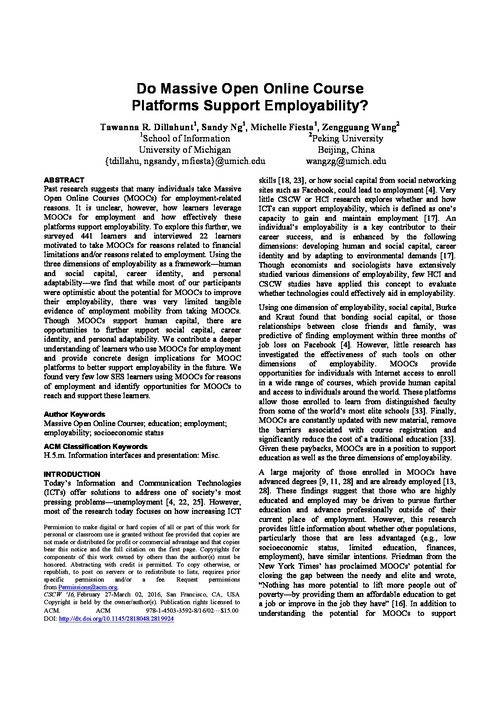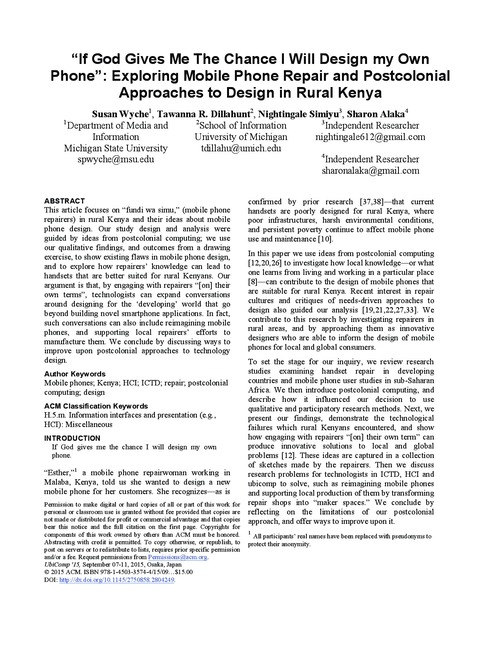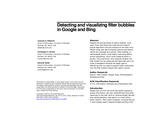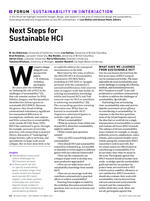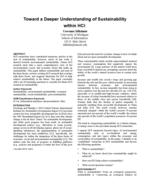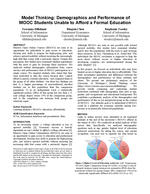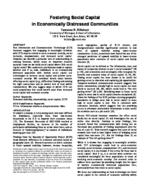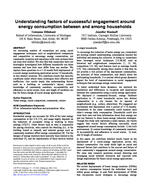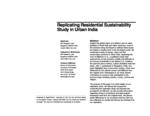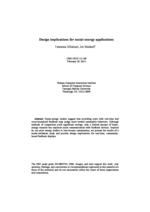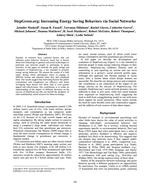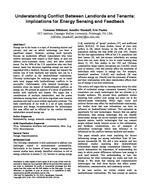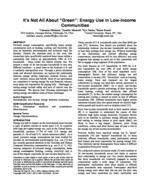Vision
The Social Innovation Group is a dynamic and diverse collective of interdisciplinary experts specializing in the research and development of ubiquitous and social computing technologies. Our vision is simple: To design, build, and enhance innovative technologies that effectively tackle real-world challenges.
Our expertise lies in addressing real-world problems affecting minoritized groups and people experiencing various forms of marginalization, particularly emphasizing the United States. Our ongoing projects aim to combat unemployment, promote environmental sustainability, and enhance technical literacy by fostering social and sociotechnical capital within these communities.
Comprised of a wide range of talented professionals, our team brings together computer scientists, designers, social scientists, and business majors. We warmly invite undergraduate and graduate researchers, Ph.D. candidates, and current and aspiring professionals who share our passion for making a positive societal impact.
Join us in our quest to leverage innovation and expertise for the betterment of society. Together, we can drive meaningful change and create a brighter future.
Ongoing Projects
We have adopted the 17 Sustainable Development Goals (SDGs) as the guiding framework for our group’s initiatives. This commitment to the SDGs ensures that our work is in harmony with a worldwide agenda dedicated to addressing the most pressing global issues.
Decent work and Economic Growth
Number of papers: 16Inform efforts to promote sustained, inclusive, and sustainable economic growth, full and productive employment, and decent work for all
Read MoreQuality Education
Number of papers: 12Inform efforts to ensure inclusive and equitable quality education; promote lifelong learning opportunities for all.
Read MoreIndustry, Innovation and Infrastructure
Number of papers: 12Inform efforts to build resilient infrastructure, promote inclusive and sustainable industrialization and foster innovation
Read MoreReduced Inequalities
Number of papers: 8Inform efforts that could reduce inequality within and among countries.
Read MoreGood Health and Well Being
Number of papers: 7Inform efforts to enable healthy lives and promote well-being for all ages
Read MoreSustainable Cities and Communities
Number of papers: 6Inform efforts to make cities and human settlements inclusive, safe, resilient, and sustainable
Read MoreNo Poverty
Number of papers: 5Inform efforts to collectively end poverty in all its forms everywhere
Read MorePeace, Justice, and Strong Institutions
Number of papers: 3Inform efforts to promote peaceful and inclusive societies for sustainable development, provide access to justice for all, and build effective, accountable, and inclusive institutions at all levels
Read MoreZero Hunger
Number of papers: 2Inform efforts to collectively end hunger, achieve food security and improved nutrition, and promote sustainable agriculture
Read MoreGender Equality
Number of papers: 2Inform efforts to achieve gender equality and inclusion for LGBTQIA+ people.
Read MoreMedia
SIG Employment Tool Research Summary
Learn more about our tools here!
Infographics
- Who did we focus on, what did we learn in terms supporting job seekers, and what can job seekers do to benefit their job search? (Graphic Designer: Sadhana Ramaseshadri, Created: April 2021)
- What did we find from our evaluations of Review-Me, SkillsIdentifier, and DreamGigs? (Graphic Designer: Sadhana Ramaseshadri, Created: April 2021)
- What online job resources did we find helpful for job seekers? (Graphic Designer: Anshika Saxena, Created: September 2021)
Papers and Publications
Eliciting Alternative Economic Futures with Working-Class Detroiters: Centering Afrofuturism in Speculative Design
Dillahunt, T.R., Lu, A.J.,Velazquez, J.
To appear in Proc. ACM DIS'23“I was able to give her the confidence”: Reciprocal-Capacity Building in a Community-based Program for Digital Engagement
Hui, J., Seefeldt, K., Sanifo, L., Baer, C., Szomstein, J., Dillahunt, T.R.
In Proc. of the CHI '24 Conference on Human Factors in ComputingCommunity Tech Workers: Scaffolding Digital Engagement Among Underserved Minority Businesses
Hui, J., Seefeldt, K.,Baer, C., Sanifu,L.,Jackson, A.,Dillahunt, T.R
In Proc. of ACM on Human-Computer InteractionVolume 7Issue CSCW2Article No.: 331pp 1–25Participatory Noticing through Photovoice: Engaging Arts- and Community-Based Approaches in Design Research
Lu, A.J., Sannon, S., Moy, C., Brewer, S., Green, J., Jackson, K.N., Reeder, D., Wafer,C., Ackerman,M.S., Dillahunt, T.R.
To appear in Proc. ACM DIS'23How Recent Migrants Develop Trust Through Community Commerce: The Emergence of Sociotechnical Adaptation
Hsiao, J.C.Y., Darling, S., and Dillahunt, T.R.
in Proc. ACM'23 Hum.-Comput. Interact. 7, CSCW 1Shifting from Surveillance-as-Safety to Safety-through-Noticing: A Photovoice Study with Eastside Detroit Residents
Lu, A.J., Sannon, S., Moy, C., Brewer, S., Green, J., Jackson, K.N., Reeder, D., Wafer, C., Ackerman, M.S, and Dillahunt, T.R.
in Proc. CHI'23. Hum. Factors. Computing. Systems.Understanding Food Planning Strategies of Food Insecure Populations: Implications for Food-Agentic Technologies
Dillahunt, T.R., Sawwan, M., Wood, D., Wimer, B.L., Conrado, A.M., Miller, H.E., Gura, A.Z., and Metoyer, R.
in Proc. CHI'23. Hum. Factors. Computing. Systems.A Collective Approach to Providing Digital Skills Training Among US Public Housing Residents
Lee, S., Hui, J., Rowe, Z., and Dillahunt, T.R.
in Proc. CHI'23. Hum. Factors. Computing. Systems.Organizing Community-based Events in Participatory Action Research: Lessons Learned from a Photovoice Exhibition
Lu, A.J., Sannon, S., Brewer, S., Jackson, K.N., Green, J., Reeder, D., Wafer, C., and Dillahunt, T.R.
in Proc. CHI'23. Hum. Factors. Computing. Systems.Opportunities for Social Media to Support Aspiring Entrepreneurs with Financial Constraints
Israni, A., Hui, J., and Dillahunt, T.R.
in Proc. ACM'23 Hum.-Comput. Interact. 7, CSCW 1Targeting Patients’ Cognitive Load for Telehealth Video Visits Through Student-Delivered Helping Sessions at a United States Federally Qualified Health Center: Equity-Focused
Antonio M.G., Williamson, A., Kameswaran, V., Beals, A., Ankrah, E., Goulet, S., Wang, Y., Macias, G., Gist, J.J., Brown, L.K., Davis, S., Pillai, S., Buis, Dillahunt, T.R., and Veinot, T.C.
in Journal. Medical. Internet. Reserach.Publication., 25Emotional Labor in Everyday Resilience: Class-based Experiences of Navigating Unemployment Amid the COVID-19 Pandemic in the US
Lu, A.J., Gilhool, A., Hsiao, J.C.Y., and Dillahunt, T.R.
in Proc. ACM'23 Hum.-Comput. Interact. 6, CSCW 2- in Proc. ACM'22
Equitable Research PRAXIS: A Framework for Health Informatics Methods
Veinot, T.C., Clarke, P.J., Romero, D.M., Buis, L.R., Dillahunt, T.R., Vydiswaran, V.V., Beals, A., Brown, L., Richards, O., Williamson, A., and Antonio, M.G.
in Yearbook. Medical. Informatics., Georg. Thieme. Verlag. KG.'22', 31, 1Citational Justice and the Politics of Knowledge Production
Citational Justice Collective, Ahmed,S., Amrute, S., Bardzell, J., Bardzell, S., Bidwell, N., Dillahunt, T.R., Karusala, N., Kumar, N., Mustafa, M., Nardi, B., Nathan, L., Parvin, N., Patin, B., Cuellar, P.R., Rouse, R., Spiel, K., Prietch, S., and Wang, D.
in Proc. ACM'22. Intercation.The Village: Infrastructuring Community-based Mentoring to Support Adults Experiencing Poverty
Dillahunt, T.R., Lu, J.A., Israni, A., Lodha, R. Brewer, S., Robinson, T.S., Wilson A.B., and Wheeler, E.
in Proc. CHI'22. Hum. Factors. Computing. Systems.Trust, reciprocity, and the role of timebanks as intermediaries: Design implications for addressing healthcare transportation barriers
Dillahunt, T.R., Maestre, J.F., Kameswaran, V., Poon, E., Torres, J.O., Gallardo, M., Rasmussen, S.E., Shih, P.C., Bagle, A., Young, S.L.A., and Veinot, T.C.
in Proc. CHI'22. Hum. Factors. Computing. Systems.Data work in education: Enacting and negotiating care and control in teachers' use of data-driven classroom surveillance technology
Lu, A.J., Dillahunt, T.R., Marcu, G., and Ackerman, M.S.
in Proc. ACM'21 Hum.-Comput. Interact. 5, CSCW 2The Promises and Perils of Technology for Marginalized Job Seekers
Dillahunt, T.R., Lu, J.A., and Wilson, B.A.
In University of Michigan Poverty Solutions'21'Implications for Supporting Marginalized Job Seekers: Lessons from Employment Centers
Dillahunt, T. R., Garvin, M., Held, M., and Hui, J.
in Proc. ACM'21 Hum.-Comput. Interact. 5, CSCW 2Elucidating Skills for Job Seekers: Insights and Critical Concerns from a Field Deployment in Switzerland
Cherubini, M., Lu, A., Hsiao, J. C.-Y., Zhao, M., Aggarwal, A., and Dillahunt, T. R.
In Proc. of DIS'21Coding Bias in the Use of Behavior Management Technologies: Uncovering Socio-technical Consequences of Data-driven Surveillance in Classrooms
Lu, A. J., Marcu, G., Ackerman, M. S., and Dillahunt, T. R.
*Honorable Mention* | In Proc. of DIS'21Examining the Use of Online Platforms for Employment: A Survey of U.S. Job Seekers
Dillahunt, T. R., Israni, A.*, Lu, A.*, Cai, M., and Hsiao, J. C.-Y.
In Proc. of CHI'21 | *The two authors contributed equally to this research.Eliciting Tech Futures Among Black Young Adults: A Case Study of Remote Speculative Co-Design
Harrington, C. N. and Dillahunt, T. R.
In Proc. of CHI'21Uncovering the Promises and Challenges of Social Media Use in the Low-Wage Labor Market: Insights from Employers
Lu, A. and Dillahunt, T. R.
In Proc. of CHI'21Examining Mobility among People Living with HIV in Rural Areas
Maestre, J. F., Dillahunt, T. R., Theisz, A. A., Furness, M., Kameswaran, V., Veinot, T., and Shih, P. C.
In Proc. of CHI'21More than Shared Ethnicity: Shared Identity’s Role in Transnational Newcomers’ Trust in Local Consumer-to-Consumer E-commerce
Hsiao, J. C.-Y. and Dillahunt, T.
In ACM CHI'21 Extended Abstract 2021`A Library of People’: Online Resource-Seeking in Low-Income Communities
Israni, A., Ellison, N. B., Dillahunt, T. R.
In Proc. ACM'21 Hum.-Comput. Interact. 5, CSCW 1Delivery Work and the Experience of Social Isolation
Seetharaman, B., Pal, J., and Hui., J.
In Proc. ACM'21 Hum.-Comput. Interact. 5, CSCW 1Mobility-on-demand versus fixed-route transit systems: an evaluation of traveler preferences in low-income communities
Yan, X., Zhao, X., Han, Y., Van Hentenryck, P., and Dillahunt, T. R.
In Transportation Research Part A'21, Vol 148SkillsIdentifier: A Tool to Promote Career Identity and Self-efficacy Among Underrepresented Job Seekers
Dillahunt, T. R. and Hsiao, J. C.-Y.
In Proc. of HICSS'21Watched, but Moving: Platformization of Beauty Work and Its Gendered Mechanisms of Control
Anwar, I. A., Pal, J., and Hui, J.
In Proc. ACM'20 Hum.-Comput. Interact. 4, CSCW 3'Learning for the Rise of China': Exploring Uses and Gratifications of State-Owned Online Platform
Lu, A. and Xu, X.
n Proc. ACM'20 Hum.-Comput. Interact. 4, CSCW 1Engaging Offline Communities Online Amid COVID-19: A Case Study of Independent Theaters
Ankenbauer, S. and Lu, A.
In ACM CSCW'20 CompanionPositive Feedback and Self-reflection: Features to Support Self-efficacy among Underrepresented Job Seekers
Dillahunt, T. R. and Hsiao, J. C.-Y.
In Proc. of CHI'20Community Collectives: Low-tech Social Support for Digitally-Engaged Entrepreneurship
Hui, J., Barber, N. R., Casey, W., Cleage, S., Dolley, D. C., Worthy, F., Toyama, K., and Dillahunt T. R.
*Honorable Mention* | In Proc. of CHI'20Additional Labors of the Entrepreneurial Self
Avle, S., Hui, J., Lindtner, S., and Dillahunt, T. R.
In Proc. ACM'19 Hum.-Comput. Interact. 3, CSCWDoes Driving as a Form of “Gig Work” Mitigate Low-Skilled Job Seekers’ Negative Long-Term Unemployment Effects?
Li, L., Dillahunt, T. R., and Rosenblat, T.
In Proc. ACM'19 Hum.-Comput. Interact. 3, CSCWDesigning Technology to Support Safety for Transgender Women & NonBinary People of Color
Dillahunt, T. R., Starks, D.L, Haimison, O.L
In Proc. (DIS) ’19 CompanionDesigning Technology to Support Safety for Transgender Women & NonBinary People of Color
Starks, D.L.,Dillahunt, T. R., Haimson, O.L.
In Proc. (DIS) ’19 Companion, 2019, pp. 289-294Life Transitions and Social Technologies: Research and Design for Times of Life Change
Haimson, O. L., Semaan, B., Dym, B., Hsiao, J. C.-Y., Herron, D., and Moncur, W.
Workshop Proposal | In ACM CSCW'19 CompanionThe Future of Work(places): Creating a Sense of Place for On-demand Work
Hui, J., Cranshaw, J., Kotturi, Y., and Kulkarni, C.
Workshop Proposal | In ACM CSCW'19 CompanionFostering Immigrants' Trust in Online Local Social Exchange
Hsiao, J. C.-Y.
Doctoral Consortium | In ACM CSCW'19 CompanionReaching Hard-To-Reach Populations: An Analysis of Survey Recruitment Methods
Xu, X., Yan, X., and Dillahunt., T. R.
oster Abstract | In ACM CSCW'19 CompanionAn alternative to slow transit, drunk driving, and walking in bad weather: An exploratory study of resourcing mode choice and demand
Goodspeed, R., Xie, T., Dillahunt, T.R., Lustig, J.
Journal of Transport Geography, Vol. 79, July 2019Online Grocery Delivery Services: An Opportunity to Address Food Disparities in Transportation-scarce Areas
Dillahunt, T. R., Simioni, S., and Xu, X.
*Best Paper* | In Proc. of CHI 2019DreamGigs: Designing a Tool to Empower Low-resource Job Seekers
Dillahunt, T. R. and Lu, A.
In Proc. of CHI 2019Towards an Effective Digital Literacy Intervention to Assist Returning Citizens with Job Search
Ogbonnaya-Ogburu, I.F., Toyama, K., and Dillahunt, T.R.
In Proc. of CHI 2019Mobility-on-Demand Versus Fixed-Route Transit Systems: An Evaluation of Traveler Preferences in Low-income Communities
Yan, X., Zhao, X., Han, Y., Van Hentenryck, P., and Dillahunt, T. R.
arXiv preprint | arXiv:1901.07607Technology to Support Immigrant Access to Social Capital and Adaptation to a New Country
Hsiao, J. C.-Y. and Dillahunt, T. R.
Proc. ACM'18 Hum.-Comput. Interact. 2, CSCW, Article 70Making a Living My Way: Necessity-driven Entrepreneurship in Resource-Constrained Communities
Hui, J., Toyama, K., Pal, J., and Dillahunt, T. R.
Proc. ACM'18 Hum.-Comput. Interact. 2, CSCW, Article 71DreamGigs: A "Stepping Stone" for Low-resource Job Seekers to Reach Their Ideal Job
Lu, A., Lam, J., and Dillahunt, T. R.
In ACM CSCW'18 CompanionReturning Citizens' Job Search and Technology Use: Preliminary Findings
Ogbonnaya-Ogburu, I. F., Toyama, K., and Dillahunt, T. R.
In ACM CSCW'18 CompanionDesigning Future Employment Applications for Underserved Job Seekers: A Speed Dating Study
Dillahunt, T. R., Lam, J., Lu, A., and Wheeler, E.
*Honorable Mention* | In Proc. of DIS 2018The Role of Demographics, Trust, Computer Self-efficacy, and Ease of Use in the Sharing Economy
Hsiao, J. C.-Y., Moser, C., Schoenebeck, S., and Dillahunt, T. R.
In Proc. of COMPASS 2018Entrepreneurship and the Socio-Technical Chasm in a Lean Economy
Dillahunt, T. R., Kameswaran, V., McLain, D., Lester, M., Orr, D., and Toyama, K.
*Honorable Mention* | In Proc. of CHI 2018Support for Social and Cultural Capital Development in Real-time Ridesharing Services
Kameswaran, V., Cameron, L., and Dillahunt, T. R.
In Proc. of CHI 2018Navigating the Job Search as a Low-Resourced Job Seeker
Wheeler, E., and Dillahunt, T. R.
In Proc. of CHI 2018The Sharing Economy in Computing: A Systematic Literature Review
Dillahunt, T. R., Wang, X., Wheeler, E., Cheng, H. F., Hecht, B., and Zhu, H.
Proc. ACM'18 Hum.-Comput. Interact. 1, CSCW, Article 38 (December 2017)Everyday Resilience: Supporting Resilient Strategies among Low-socioeconomic-status Communities
Vyas, D. and Dillahunt, T.
Proc. ACM'18 Hum.-Comput. Interact. 1, CSCW, Article 105 (December 2017)Reducing Children’s Psychological Distance from Climate Change via Eco-feedback Technologies
Dillahunt, T., Lyra, O., Barreto, M., and Karapanos, E.
International Journal of Child-Computer Interaction, Volume 13, 2017Technology for Underserved Communities
Dillahunt, T.
acmqueue Research for Practice: Expert-curated guides to the best of CS research. | 2017Uncovering the Values and Constraints of Real-time Ridesharing for Low-resource Populations
Dillahunt, T.R., Kameswaran, V., Li, L., and Rosenblat, T.
In Proc. of CHI 2017.Detecting Life Changes: Increasing Opportunities to Benefit from People-Nearby Applications
Hsiao, J. C.-Y. and Dillahunt, T.R.
In CHI Extended Abstract 2017.Opportunities to Address Information Poverty with Social Search
Wheeler, E., Dillahunt, T. R., and Rieh, S. Y.
In CHI Extended Abstract 2017.Reflections on Design Methods for Underserved Communities
Dillahunt, T.R., Erete, S., Galusca, R., Israni, A., Nacu, D., and Sengers, P.
CSCW 2017 WorkshopPeople-Nearby Applications: How Newcomers Move Their Relationships Offline and Develop Social and Cultural Capital.
Hsiao, J. C.-Y. and Dillahunt, T.R.
In Proc. of CSCW 2017.Designing for Disadvantaged Job Seekers: Insights from Early Investigations
Dillahunt T.R., Bose, N., Diwan, S., and Chen-Phang, A.
In Proc. of DIS 2016.Project Boost: Addressing the Socio in a Socio-Technical System to Improve Income-Earning Opportunities in Urban America.
Kameswaran, V. Marathe, M., Dillahunt, T., Pal, Joyojeet, Reinecke, K., and Toyama, K.
CHI 2016. Workshop: Development Consortium 2016: HCI Across BordersDo Massive Open Online Course Platforms Support Employability?
Dillahunt, T., Ng, S., Fiesta, M., Wang, Z.
In Proc. of CSCW 2016.If God Gives Me the Chance I Will Design My Own Phone
Wyche, S., Dillahunt, T., Simiyu, N., Alaka, S.
*Honorable Mention* | In Proc. of UbiComp 2015.Promise of the Sharing Economy among Disadvantaged Communities
Dillahunt, T.R. and Malone, A.R.
In Proc. of CHI 2015Detecting and visualization filter bubbles in Google and Bing
Dillahunt, T., Brooks, C., Gulati, S.
In CHI Extended Abstract 2015Learn with Friends: The Effects of Student Face-to-Face Collaborations on Massive Open Online Course Activities
Brooks, C., Stalburg, C., Dillahunt, T., Robert, L
In Proc. of Learning at Scale 2015Next steps for sustainable HCI
Silberman, M.S., Nathan, L., Knowles, B., Bendor, R., Clear, A., Håkansson, Dillahunt, T., Mankoff, J.
Interactions, September – October 2014- CHI 2014, Workshop on Sustainability. What Have We Learned?
Democratizing Higher Education: Exploring MOOC Use Among Those Who Cannot Afford a Formal Education
Dillahunt, T., Wang, Z., Teasley, S.D.
The International Review of Research in Open and Distance Learning (IRRODL), Vol 15, No 5 (2014): Special Issue: Research into Massive Open Online CoursesModel Thinking: Demographics and Performance of MOOC Students Unable to Afford a Formal Education
Dillahunt, T., Chen, B., Teasley, S.
In Proc. of Learning at Scale 2014- In Proc. of CHI 2014
Understanding factors of successful engagement around energy consumption between and among households
Dillahunt, T., Mankoff, J.
In Proc. of CSCW 2014Deep Conservation in Urban India and its Implications for the Design of Conservation Technologies
Shrinivasan, Y., Jain, M., Seetharam, D., Choudhary, A., Huang, E., Dillahunt, T., Mankoff, J.
In Proc. of CHI 2013- CHI 2013, Post-Sustainability Workshop
Replicating Residential Sustainability Study in Urban India
Jain, M., Shrinivasan, Y., Dillahunt, T.
CHI 2013, Replication WorkshopDesign implications for social-energy applications
Dillahunt, T., Mankoff, J.
CMU-HCII-12-100, SCS, Carnegie Mellon University, Human-Computer Interaction Institute CollectionStepGreen.org: Increasing energy saving behaviors via social networks
Mankoff, J., Fussell, S., Dillahunt, T., Glaves, Rachel, Grevet, C., Johnson, M., Matthews, D., Matthews, H.S., McGuire, R., Thompson, R.
In Proc. of ICWSM 2010Understanding conflict between landlords and tenants: Implications for energy sensing and feedback
Dillahunt, T., Mankoff, J., Paulos, E.
In Proc. of UbiComp 2010It’s not all about green: energy use in low-income communities.
Dillahunt, T., Mankoff, J., Paulos, E., Fussell, S.
In Proc. of UbiComp 2009UbiGreen: investigating a mobile tool for tracking and supporting green transportation habits.
Froehlich, J., Dillahunt, T., Klansja, P., Mankoff, J., Consolvo, S., Harrison, B., Landay, J.
In Proc. of CHI 2009
Our Amazing Team
Core
Tawanna Dillahunt
Principal Investigator, Team Lead |
UMSI Associate Professor
Aarti Israni
UMSI Ph.D. Student
Sylvia Darling
UMSI Ph.D. Student (MSI Alum)
Alex Lu
UMSI Ph.D. Student (MSI Alum)
Soyoung Lee
UMSI Ph.D. Student (MSI Alum)
Denny L. Starks
UM Ph.D. student (MSI Alum)
Cameron Moy
UMSI undergrad, Minor in Social Class and Inequality and Music
Bridgit Jung
UMSI Undergraduate student, Minor in Art & Design
Mila Filipof
UMSI Graduate student
Jared Katzman
UM Ph.D. Student
Srishti Bijjur
UM MSI Student
Affiliates
Julie Hui
UMSI Assistant Professor
Mustafa Naseem
UMSI Clinical Assistant Professor
Kentaro Toyama
UMSI W K Kellogg Professor of Community Information
Matthew Bui
UMSI Assistant Professor
Mark Ackerman
UMSI Professor
Alum
Ihudiya Finda Ogbonnaya-Ogburu
UMSI Ph.D. Alum
Vaishnav Kameswaran
UMSI Ph.D. Alum
Shruti Sannon
Postdoctoral Computing Innovation Fellow
James Lisowski
UM Undergraduate Alum
Pratik Mangtani
UM MSI Alum
Cindy Zhao
UM Undergraduate Alum
Amelia Duffy
UM Undergradate Alum
Anshika Saxena
UM MSI Alum
Anandita Aggarwal
UM MSI Alum
Alexis Ashby
UM MSI Alum
Brittney Atkinson-McFarlane
NSF REU Alum, Cornell University Student
Ameera Ayodeji
NSF REU and Bowie State Alum
Seungjoo Baek
UM MSI Alum
Jacob Berman
UM MSI Alum
Nishan Bose
UM MSI Alum
Jason Brill
UM CS/Design Undergraduate Alum
Thaddeus Brown
NSF REU and Bowie State Alum
Mingzhi Cai
UM CS Alum
Asha Chen-Phang
NSF REU Alum, Northeastern University Student
David Cui
UM Alum
Jonathan De Heus
UM MSI Alum
Suleman Diwan
Developer
Michelle Fiesta
UM MSI Alum
Indulekha Ghandikota
UROP Student, EECS Alum
Anna Gilhool
UM MSI Alum
Samarth Gulati
UM MSI Alum
Marcy Held
UM MSI Alum
Joey Chiao-Yin Hsiao
UMSI Ph.D. Alum
Benjamin Jen
UROP Student, LSA Alum
Jashanjit Kaur
UM MSI Alum
Emory Kimball
UM Dearborn Undergraduate Alum
Malavika Krishnamachari
High School Student/Visiting Research Assistant Alum
Saebom April Kwon
UM MSI Alum
Jason Lam
UM MSI Alum
Eva Li
UM Alum
Ruchita Lodha
UM MSI Alum
Amy Malone
NSF REU Alum, University of Maryland Undergraduate Student
Sandy Ng
UM MSI Alum
Hailey Patterson
UROP Student, LSA Alum
Pablo-Alejandro Quionones, Ph.D.
UM MSI Alum
Sadhana Ramaseshadri
UM MSI Alum
Jessica Salvador
UMSI REMS Alum, University of Washington
Kaushal Solanki
UM MSI Alum
Mingda Tang
UM Alum
Raden Tonev
UM MSI Alum
Jaleesa Rosario Turner
UMSI Student/REMS Alum
Zengguang (Brian) Wang
UM Alum
Alice Wang
UM MSI Alum
Earnest Wheeler
UM MSI Alum
Xuecong (Esme) Xu
UM Alum
Yongwei Yuan
UM CS Alum
Muhan Zhao
UM CS Alum





